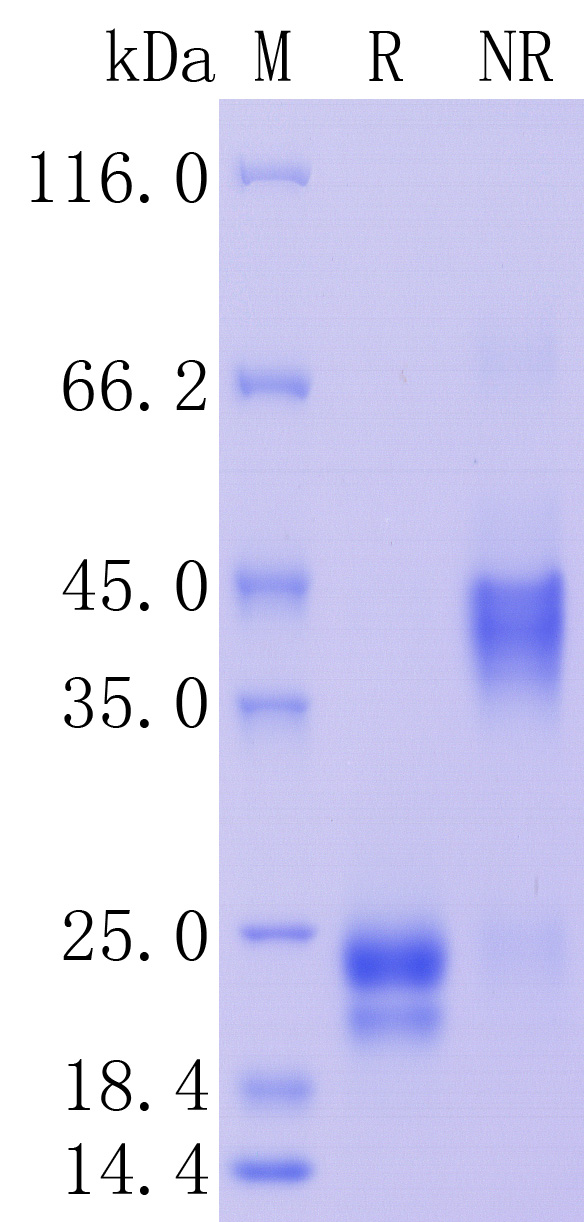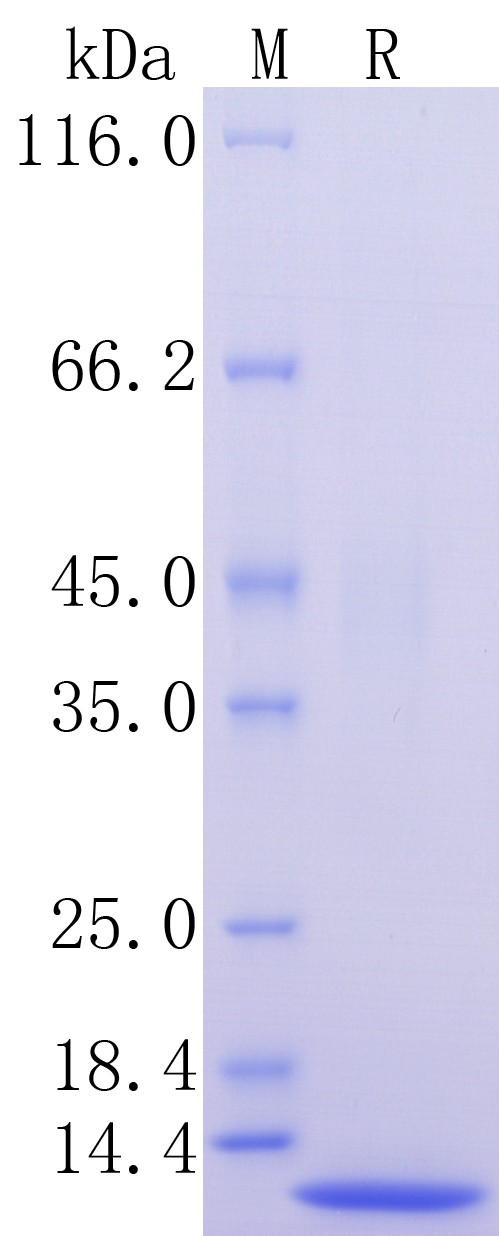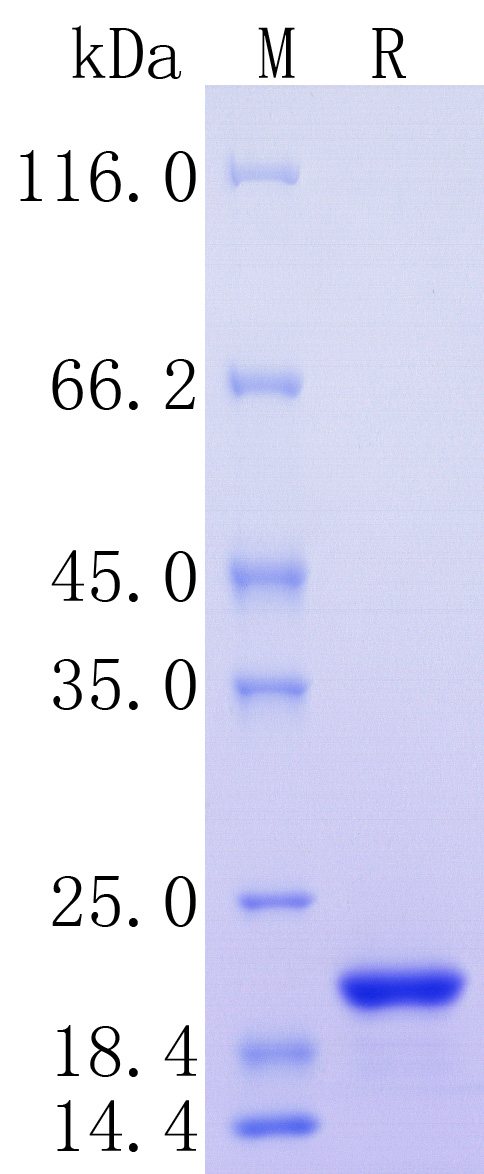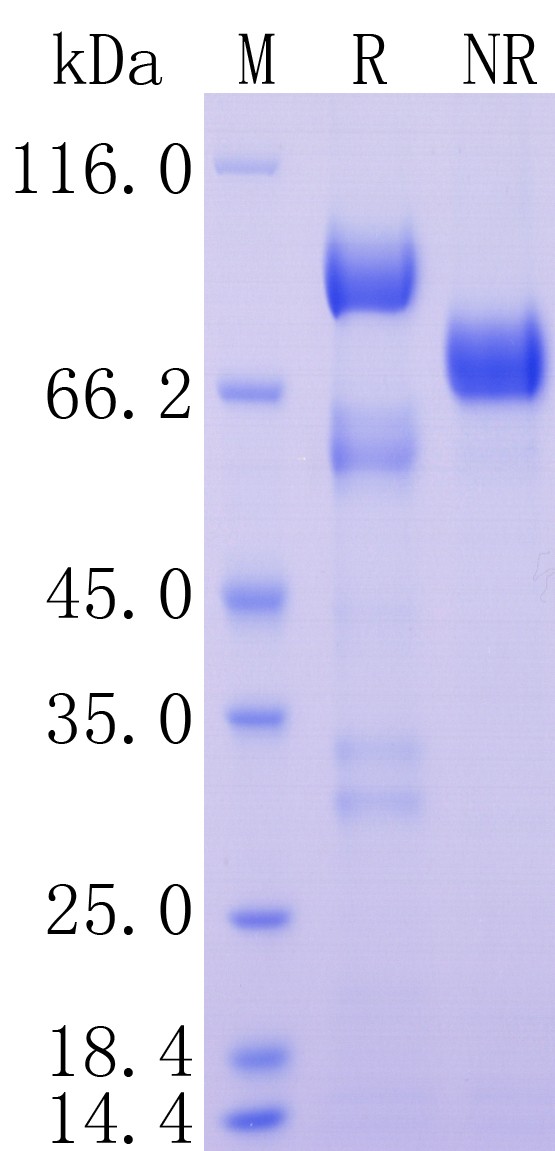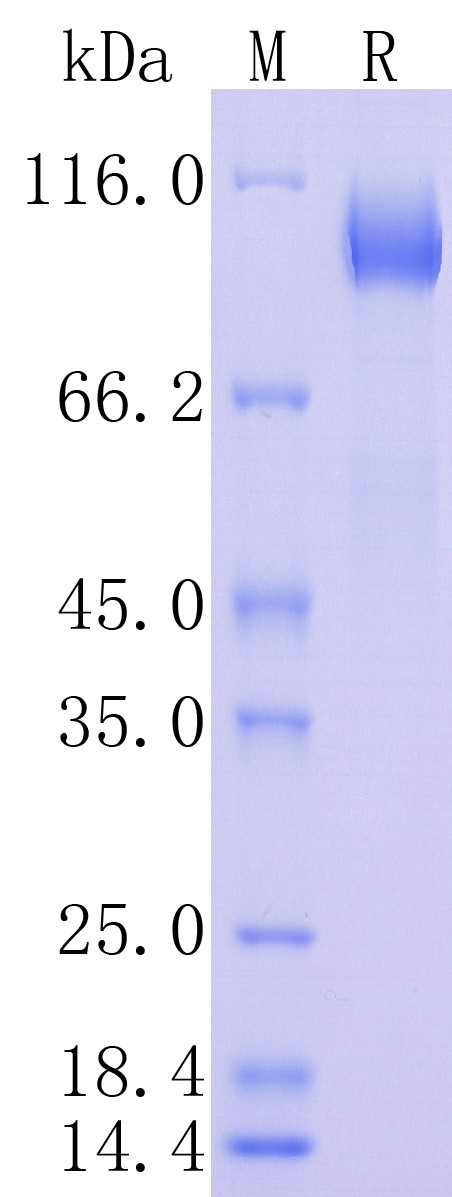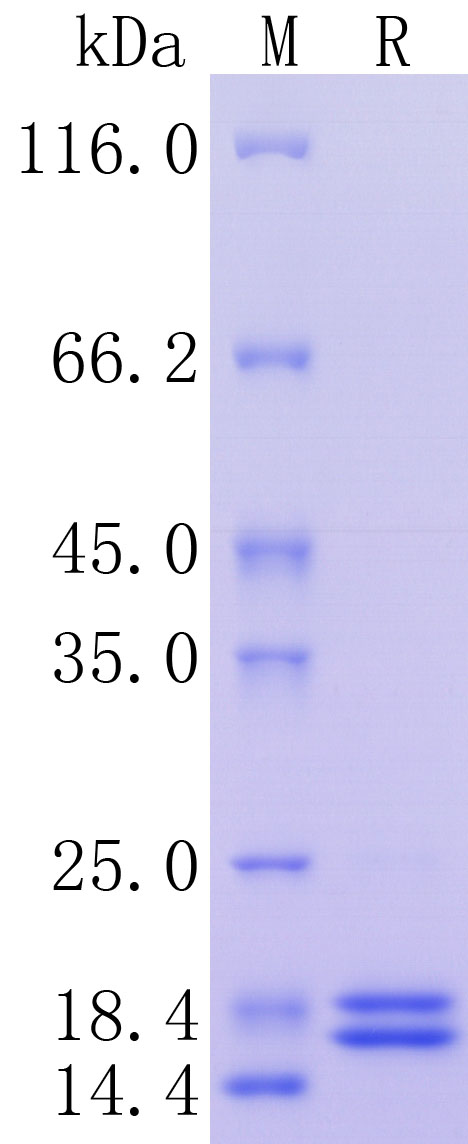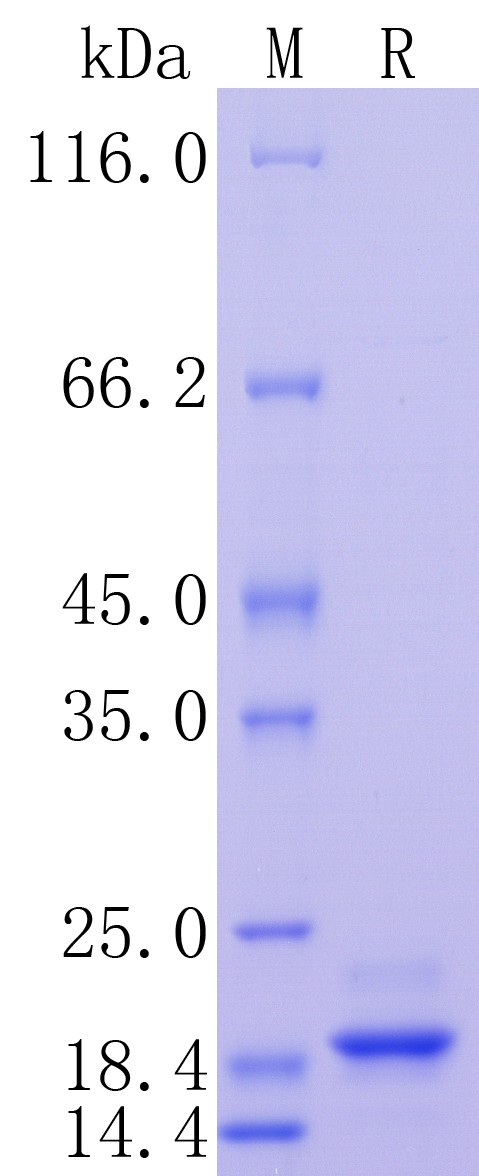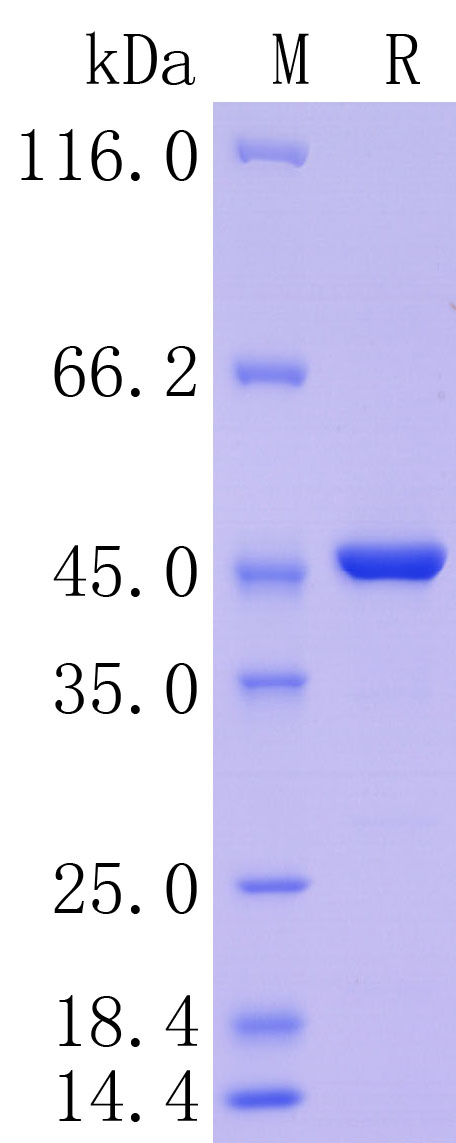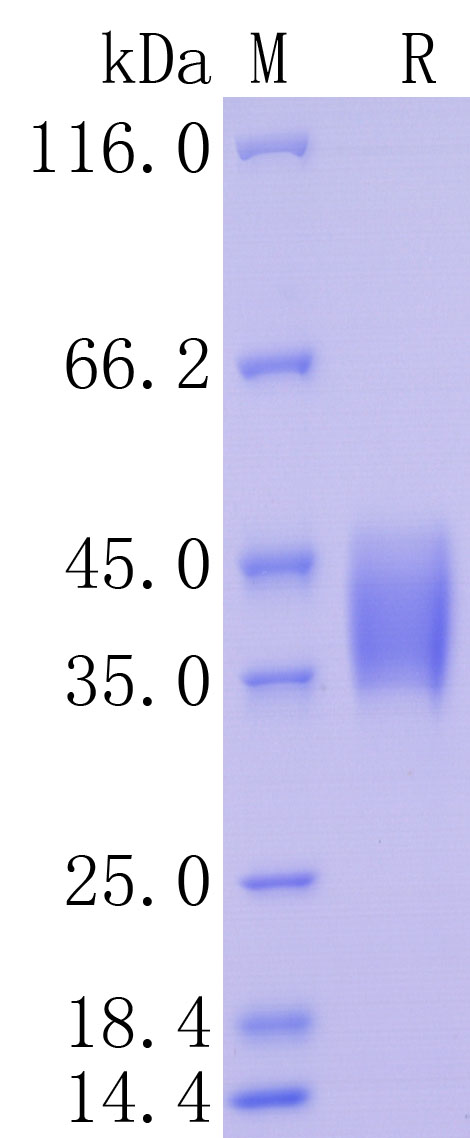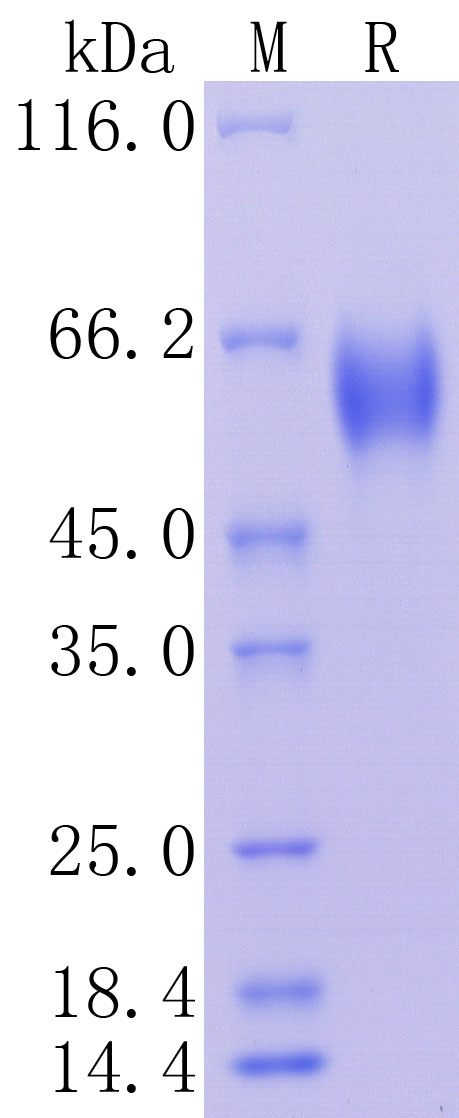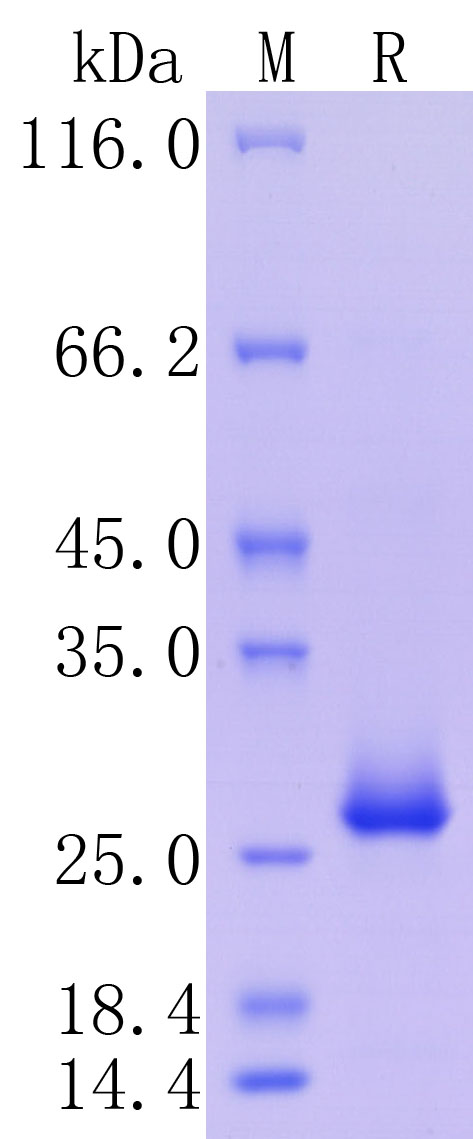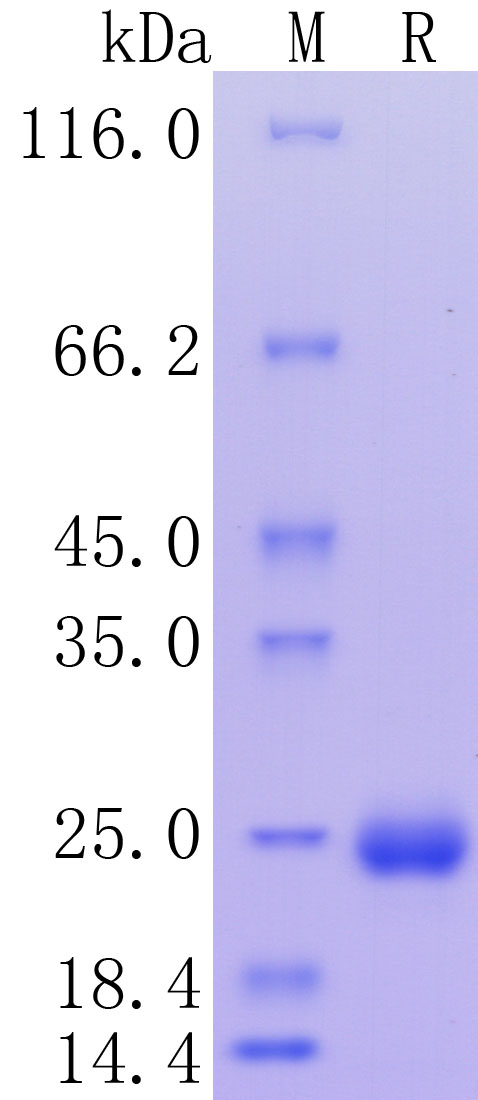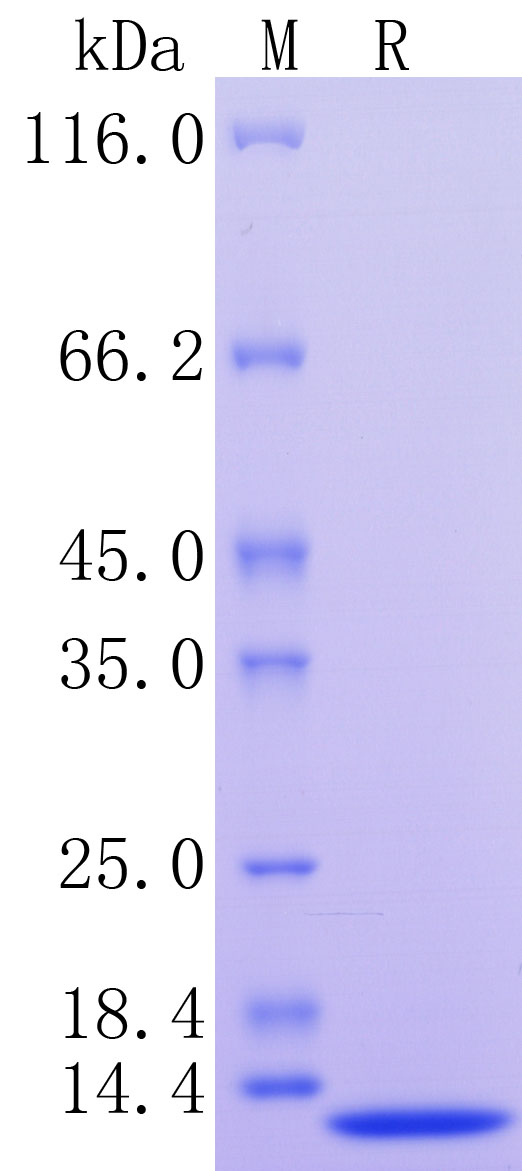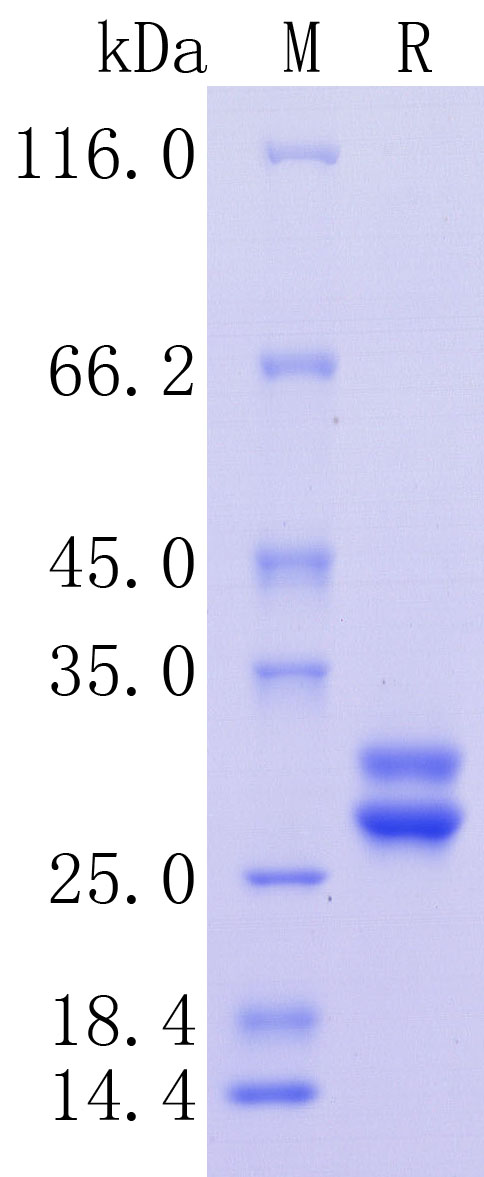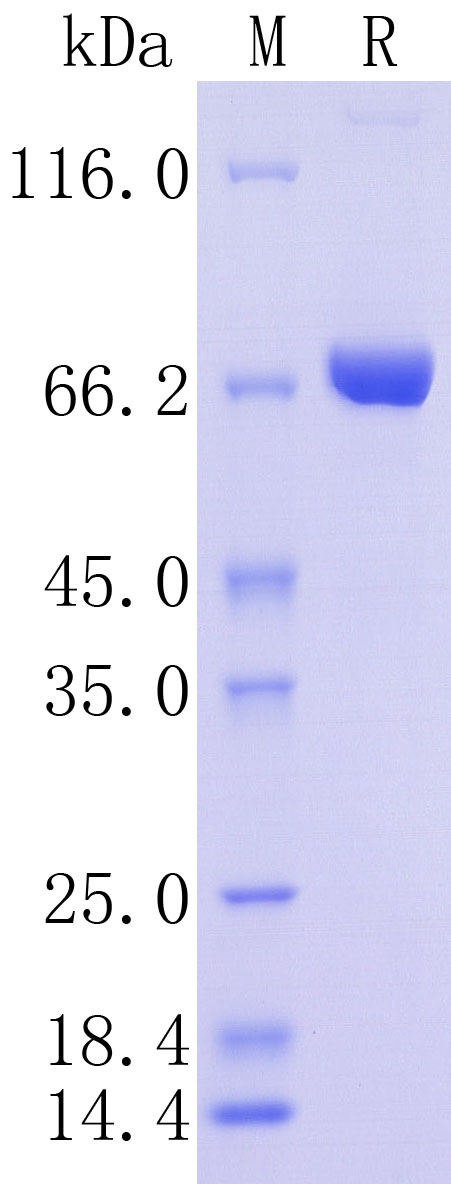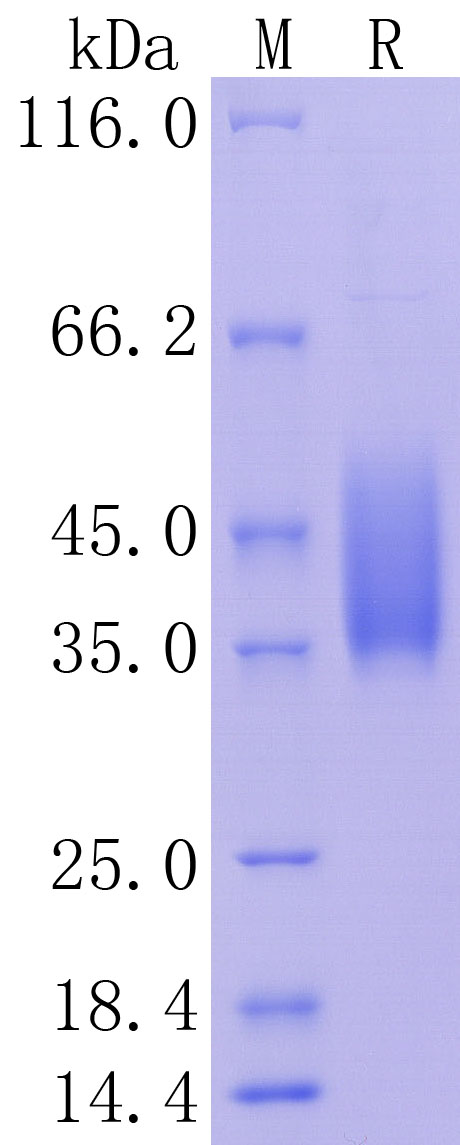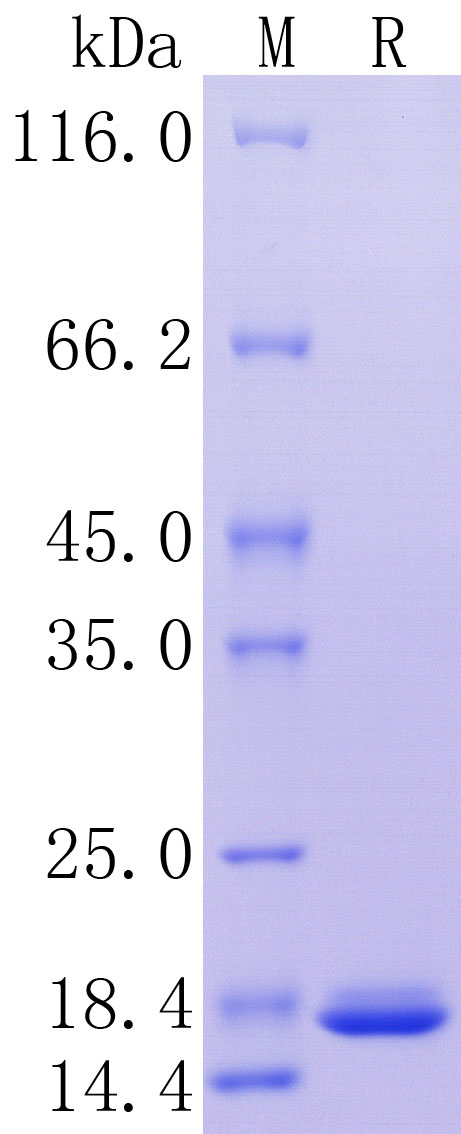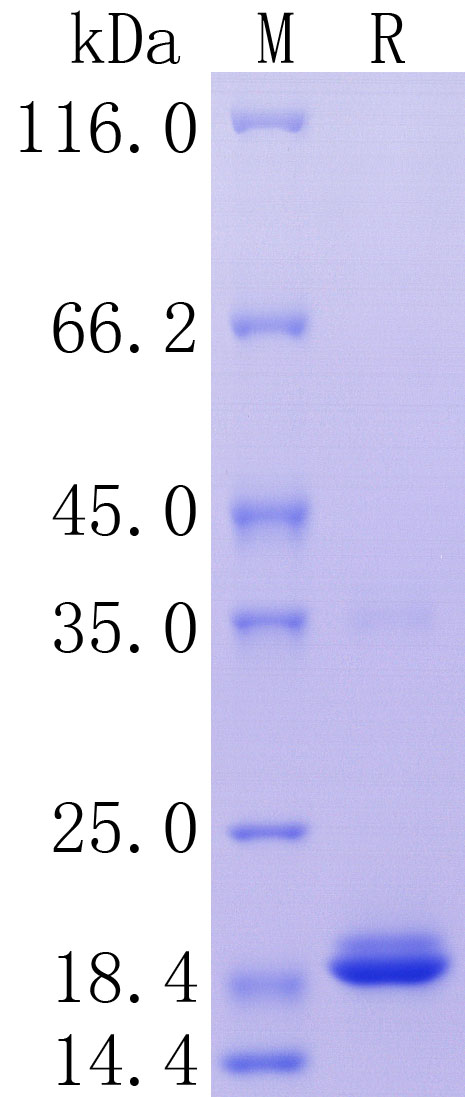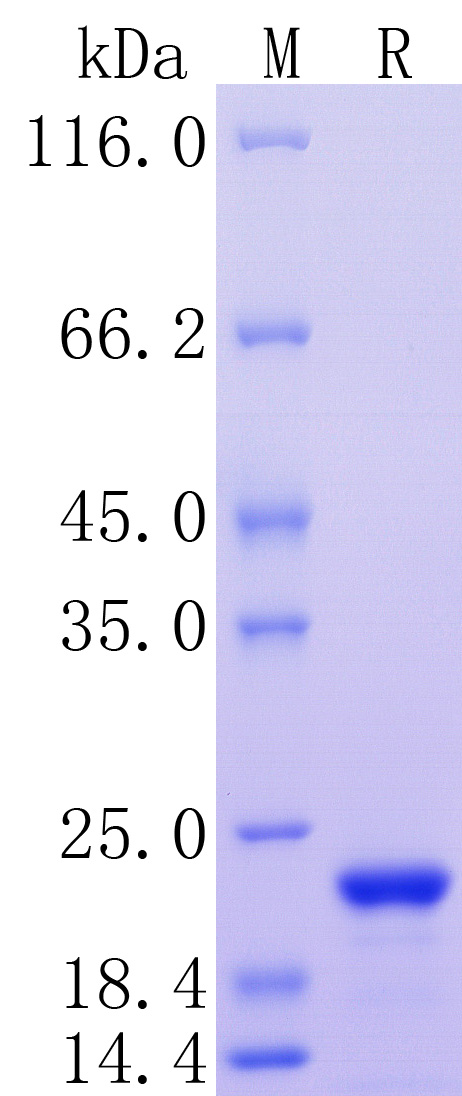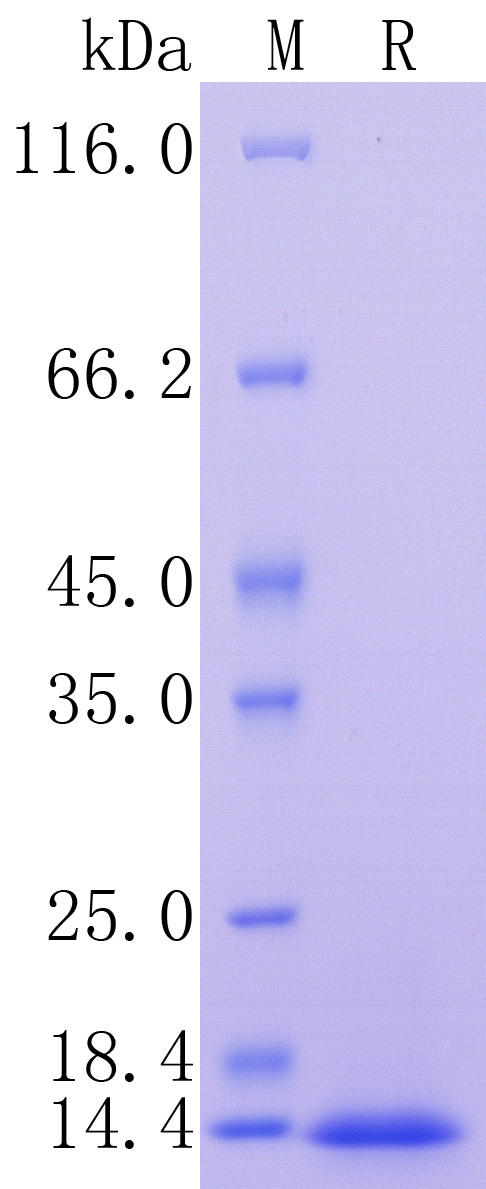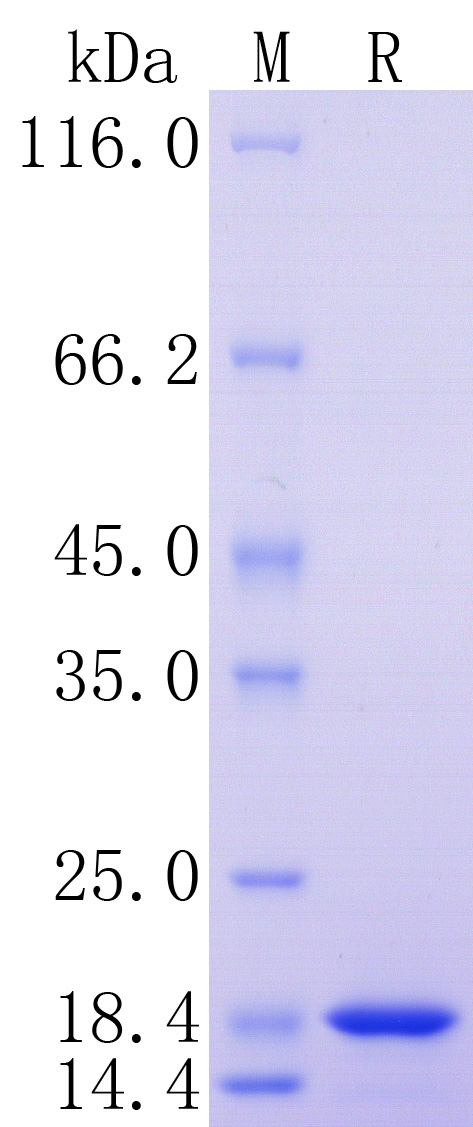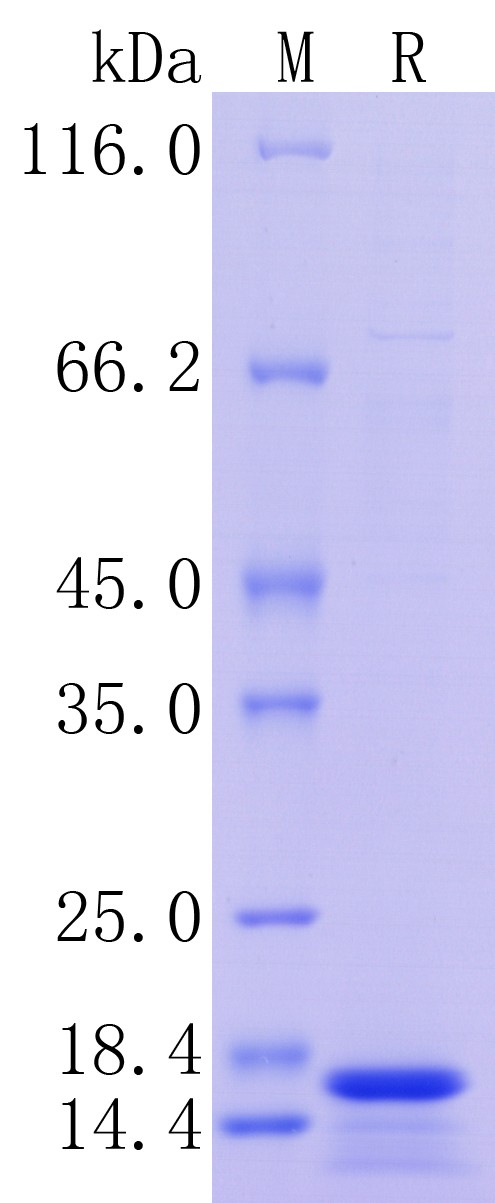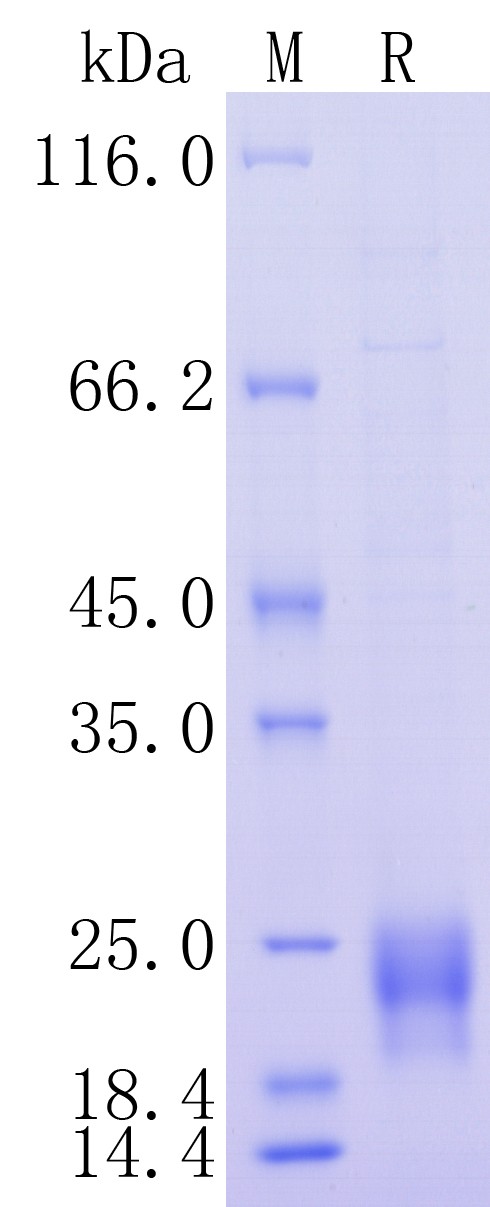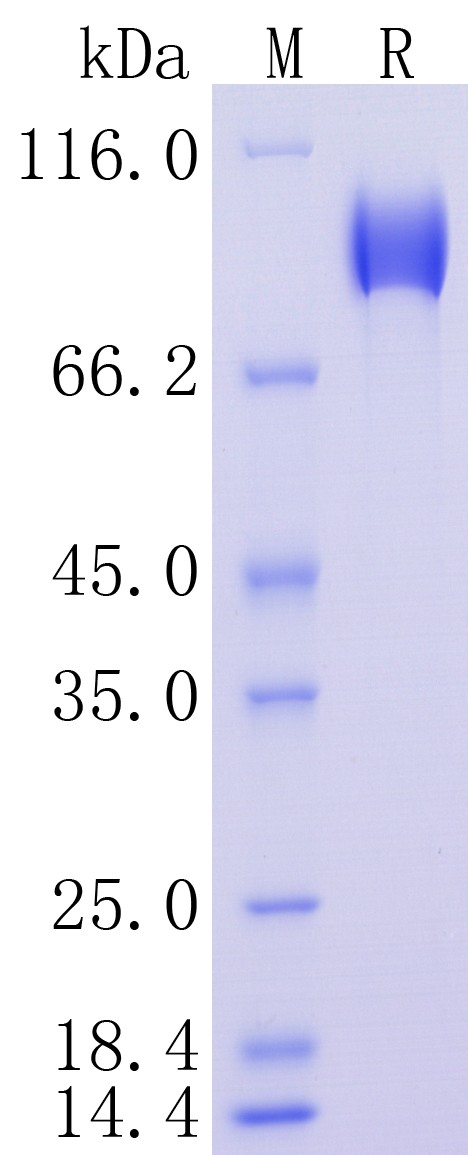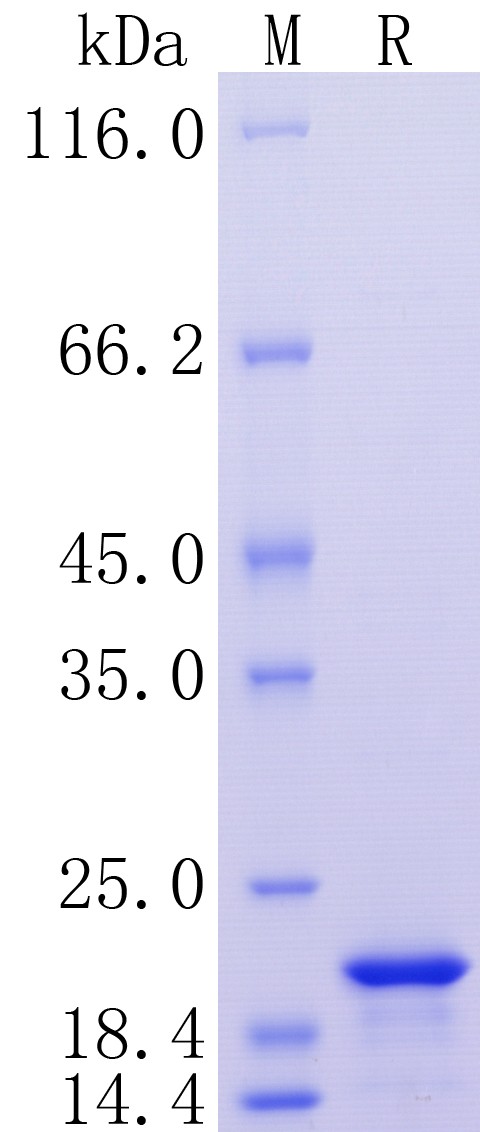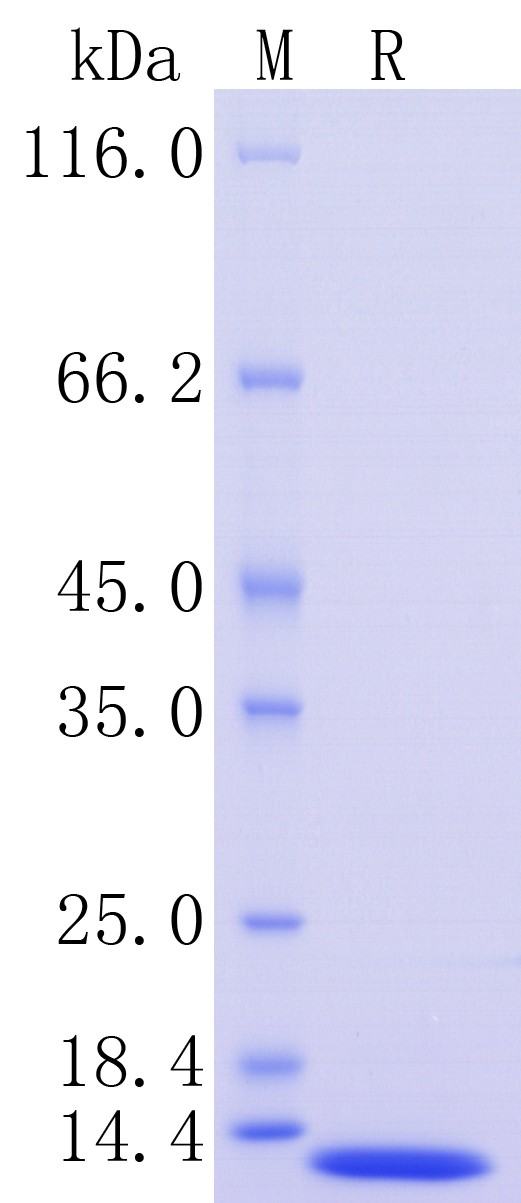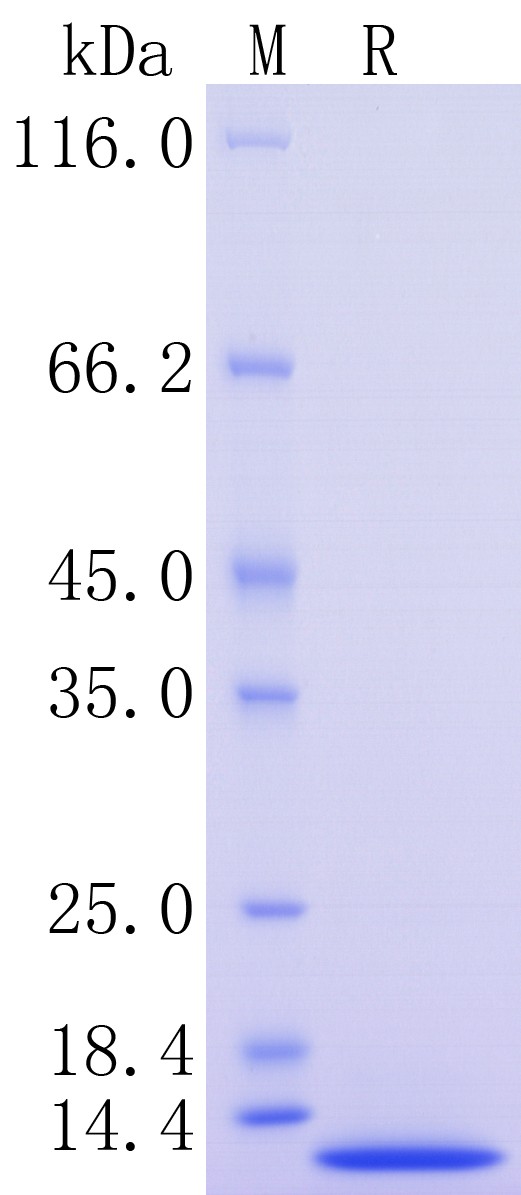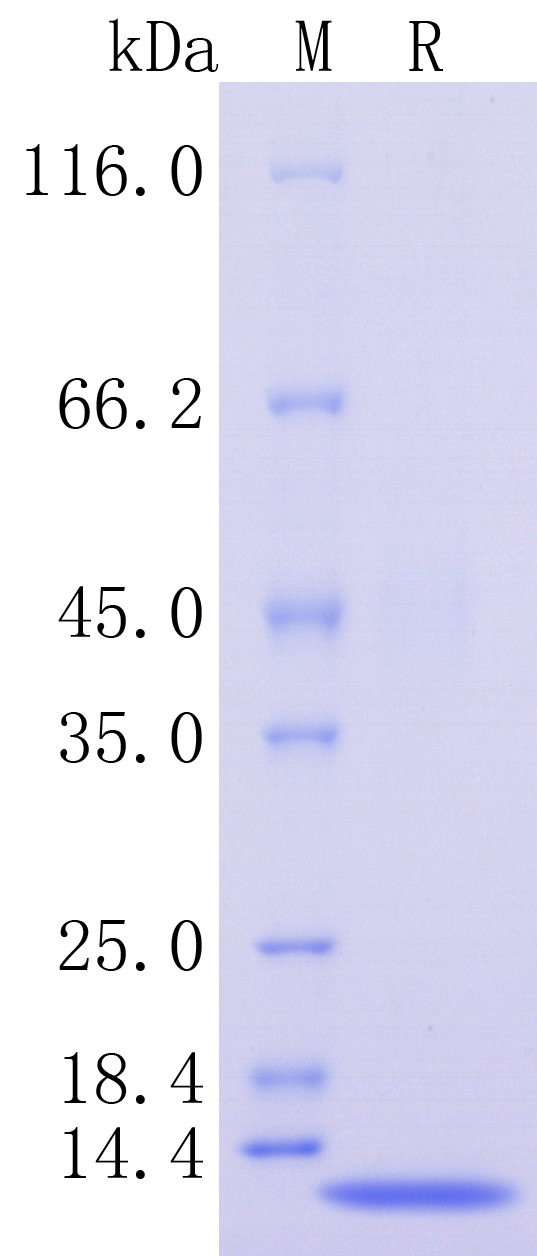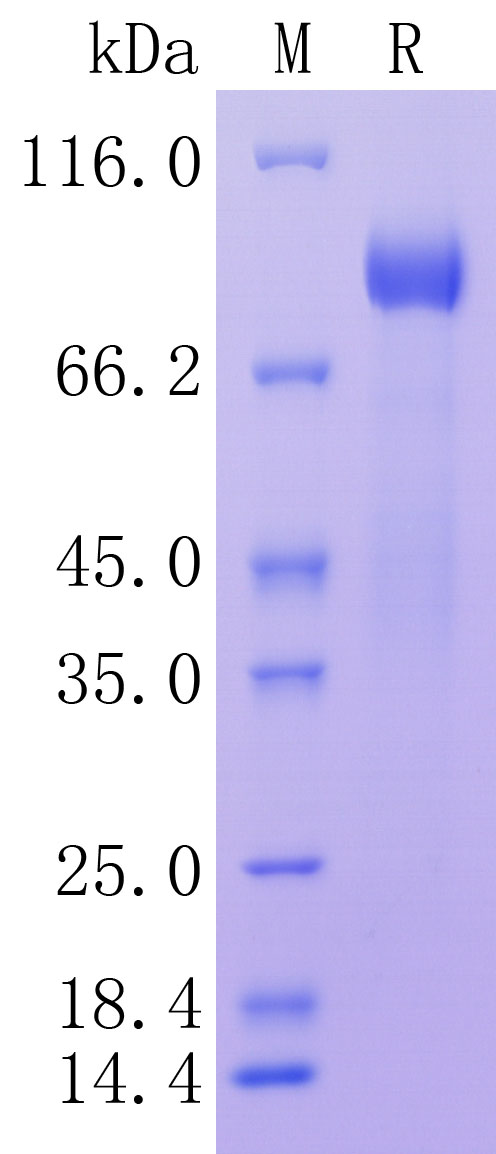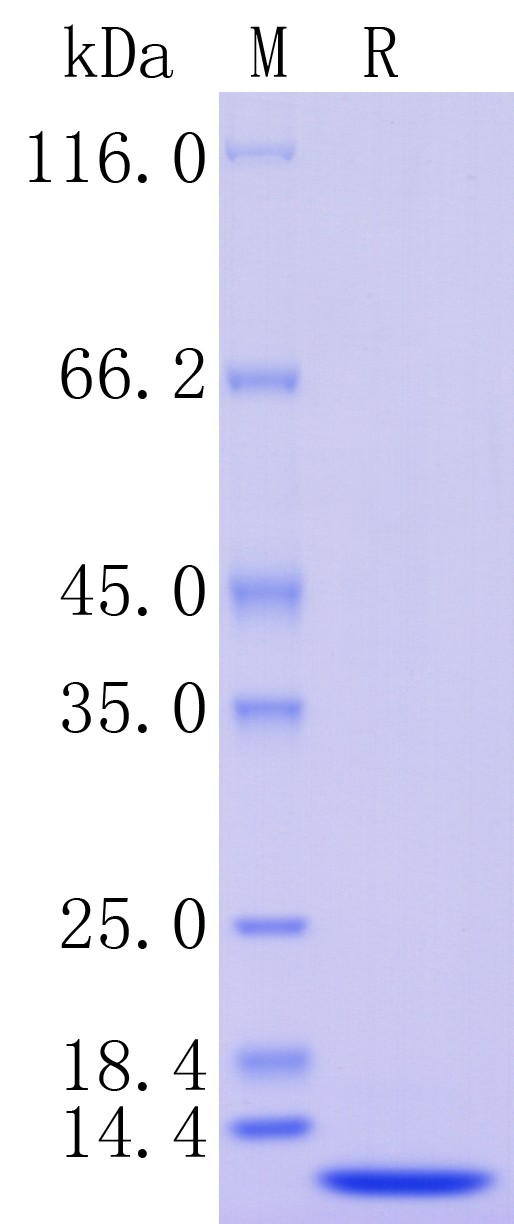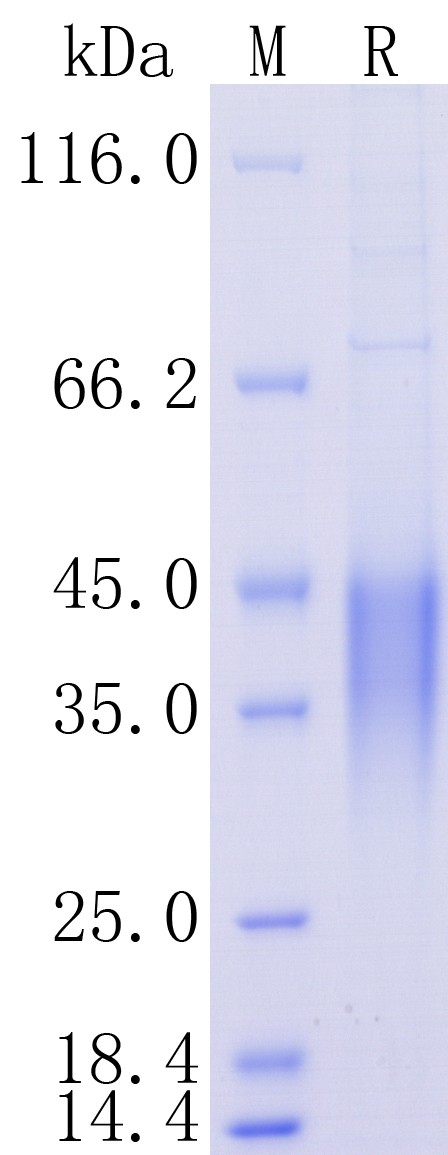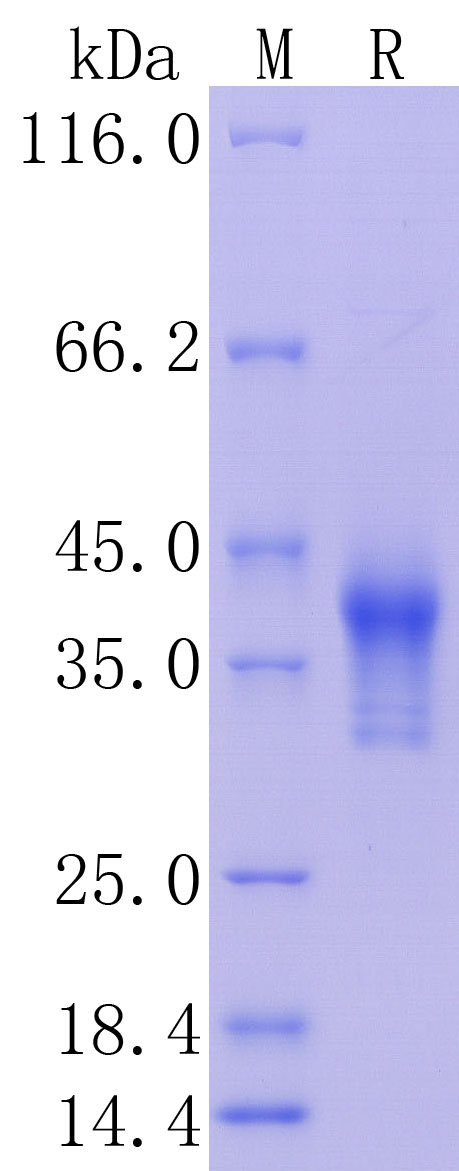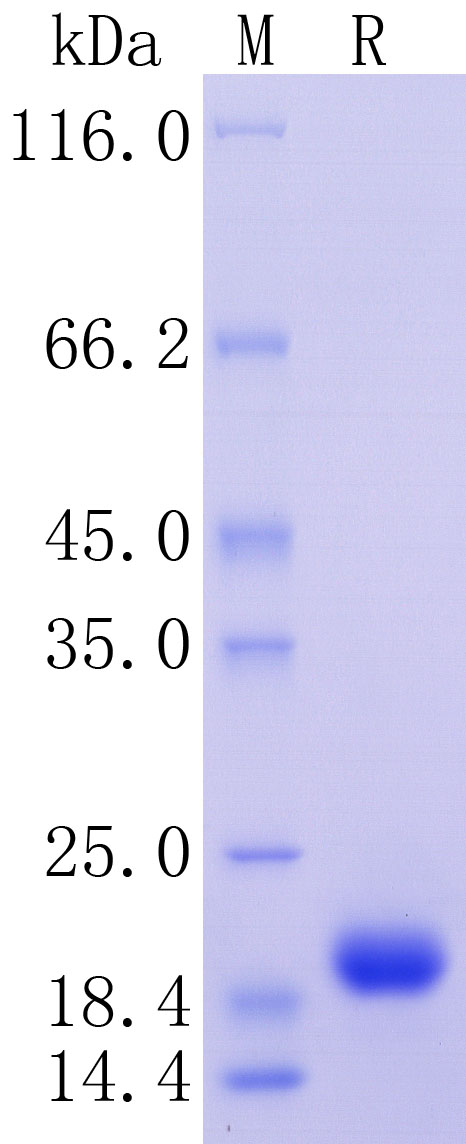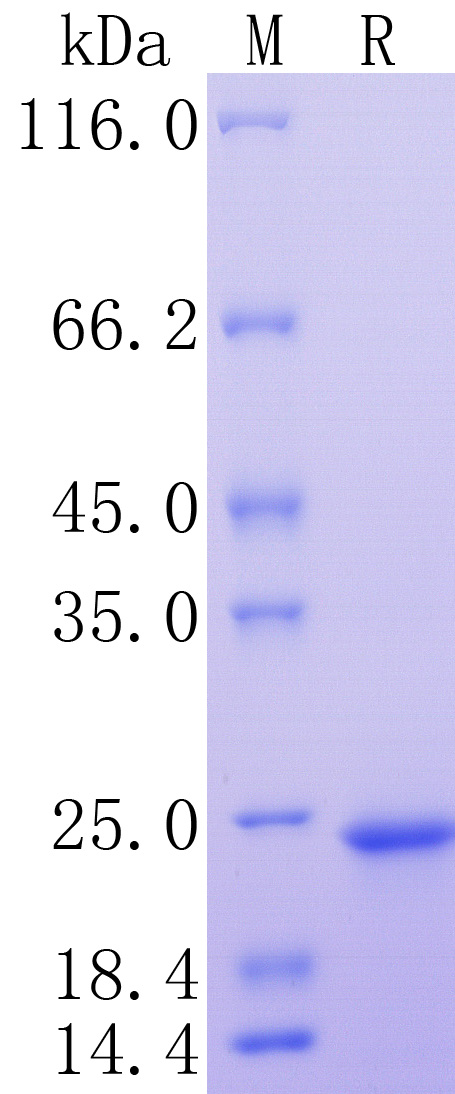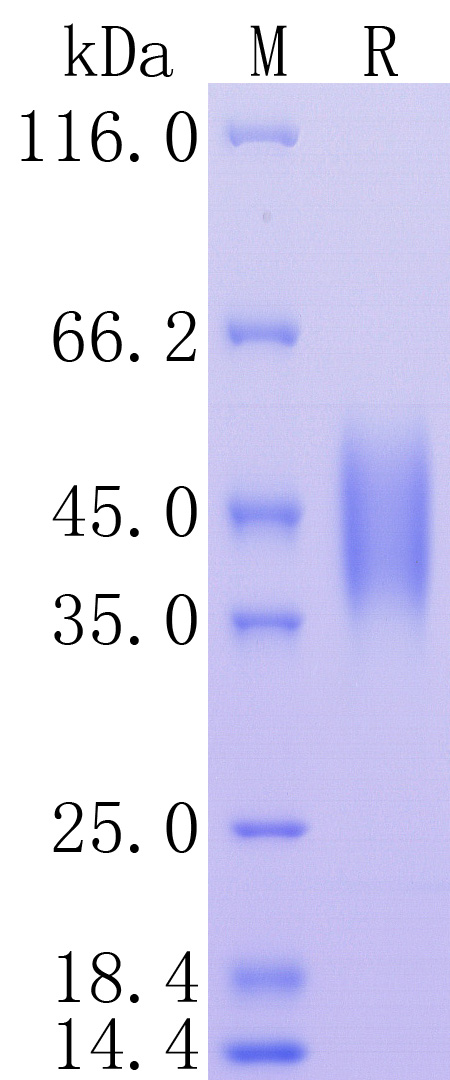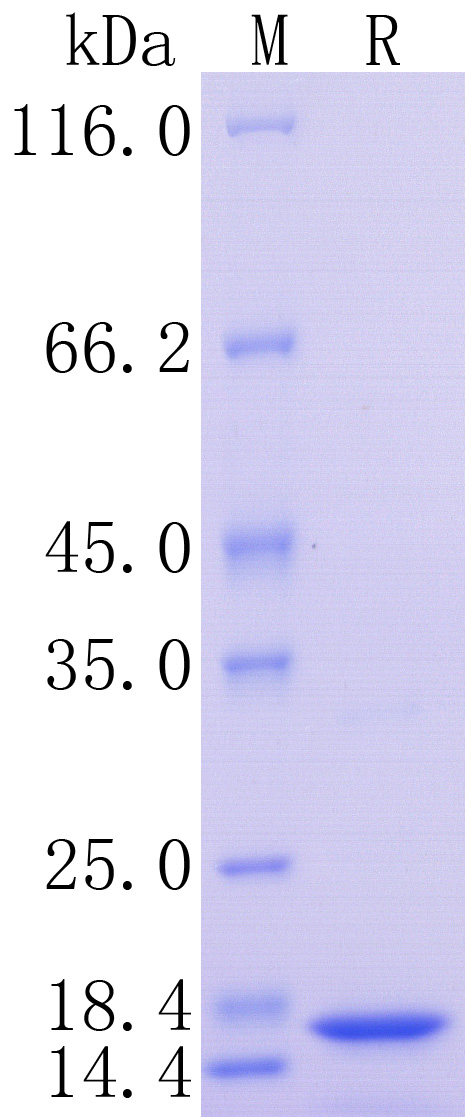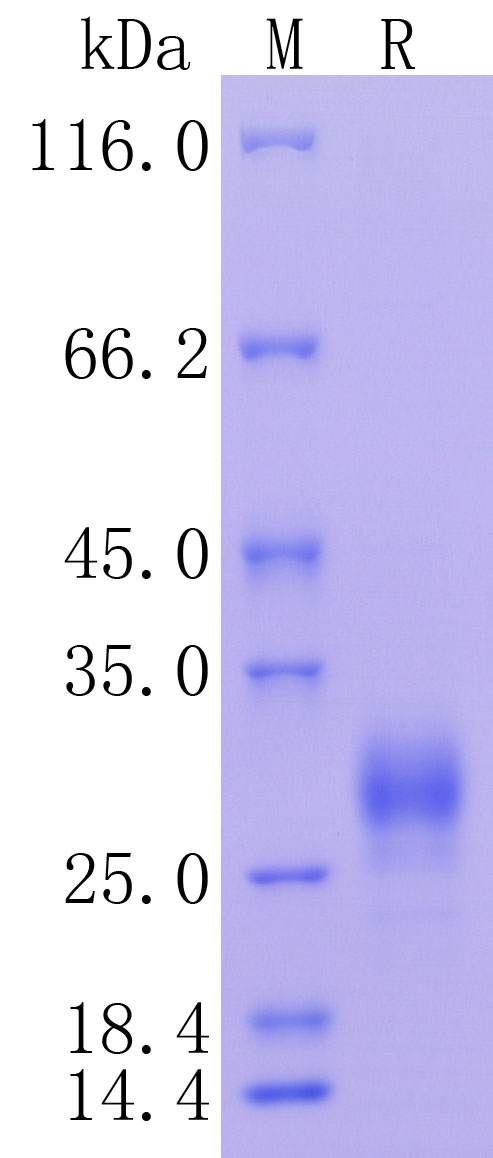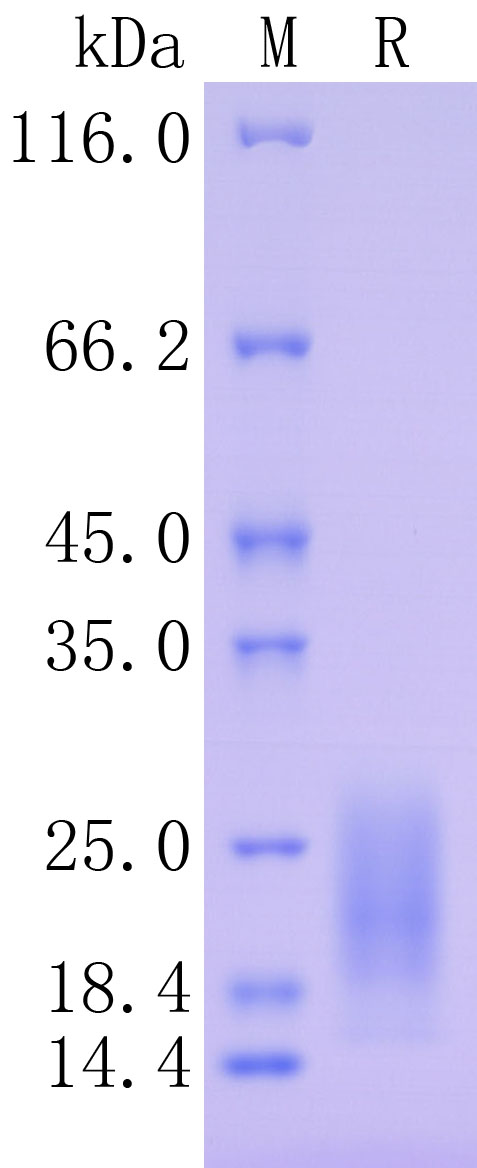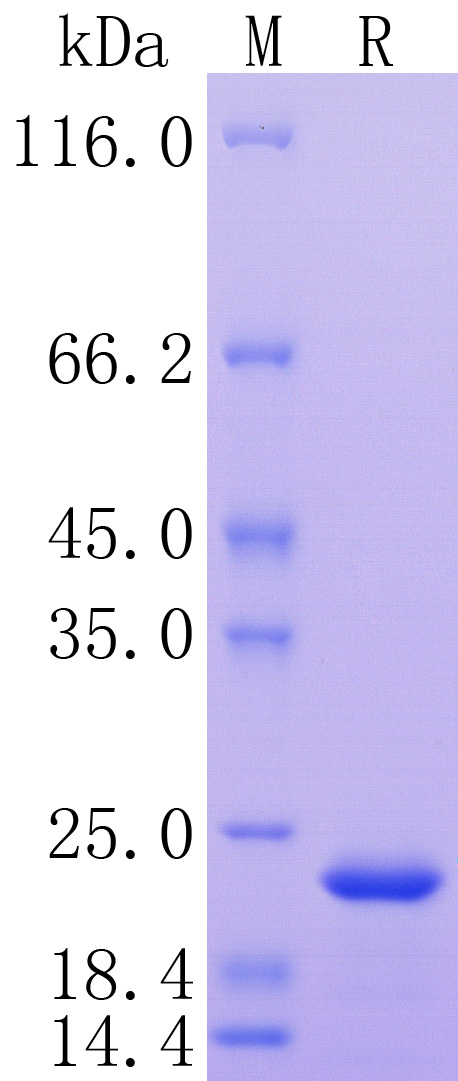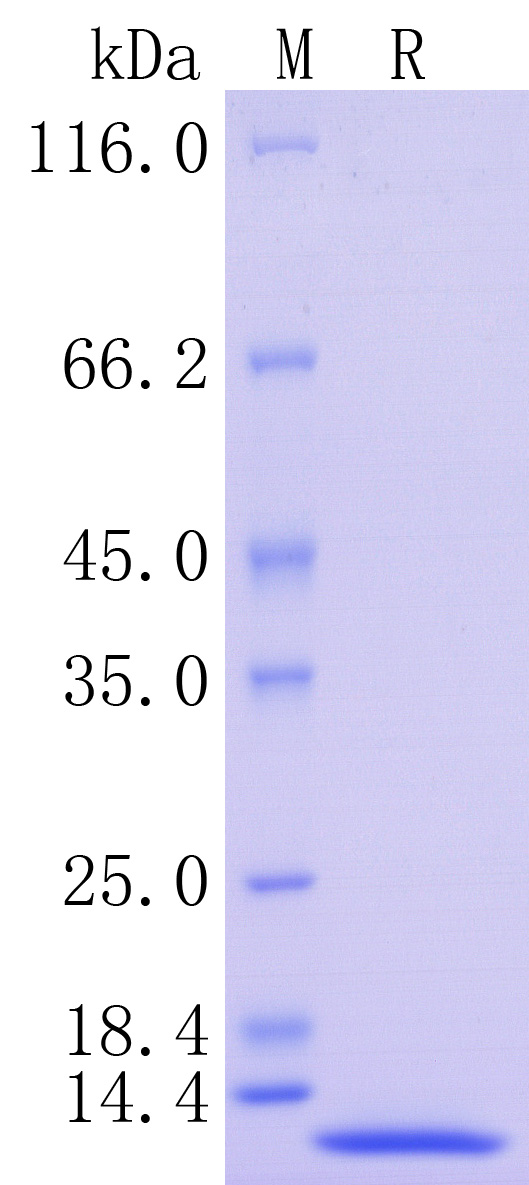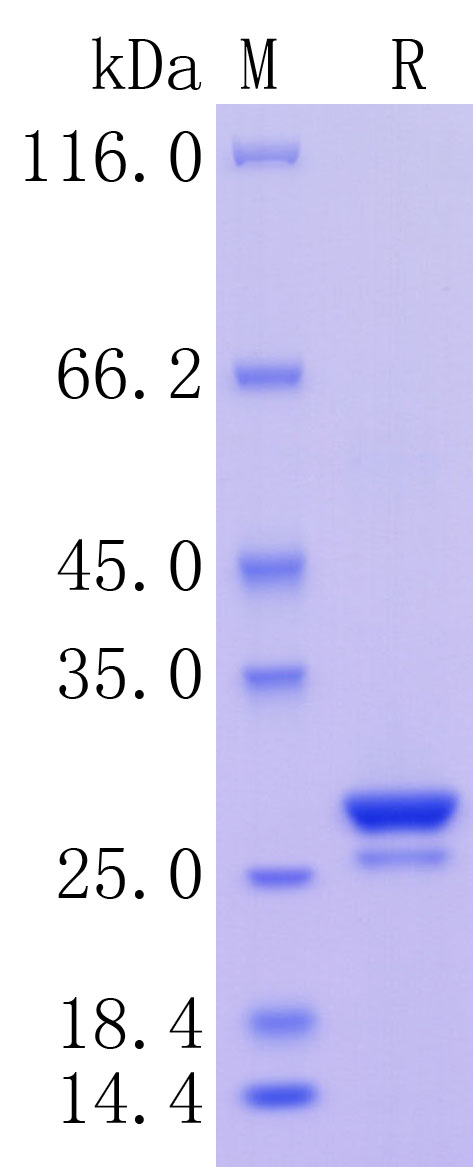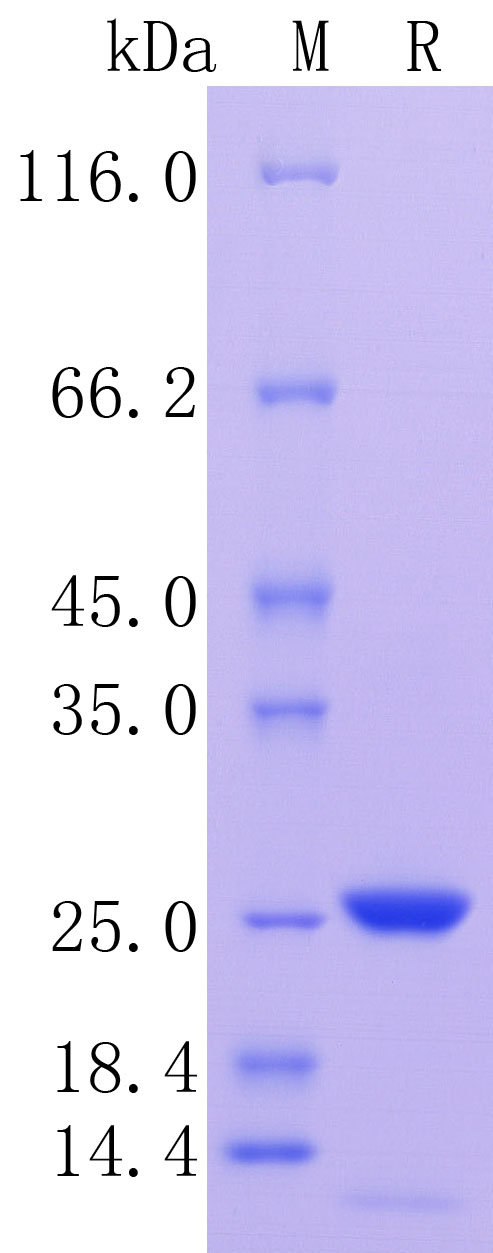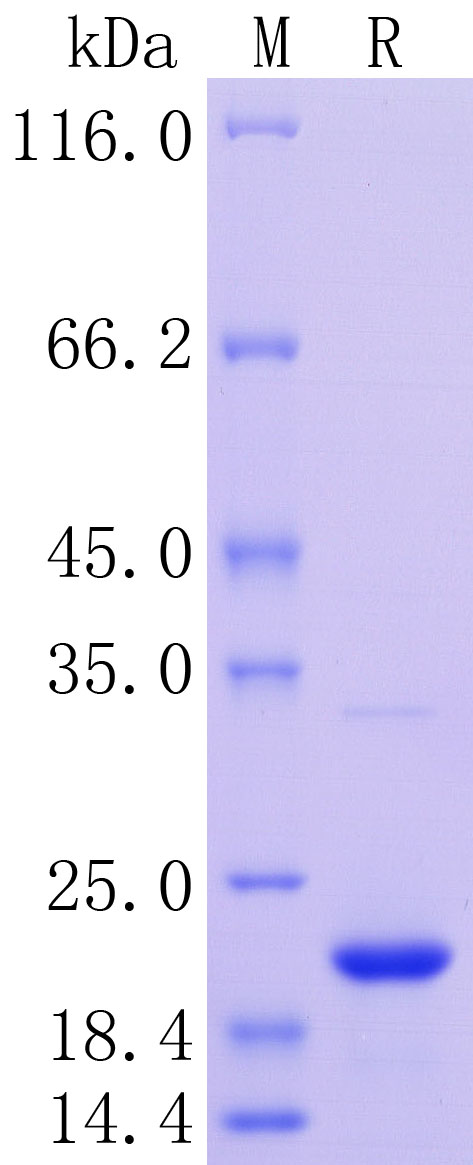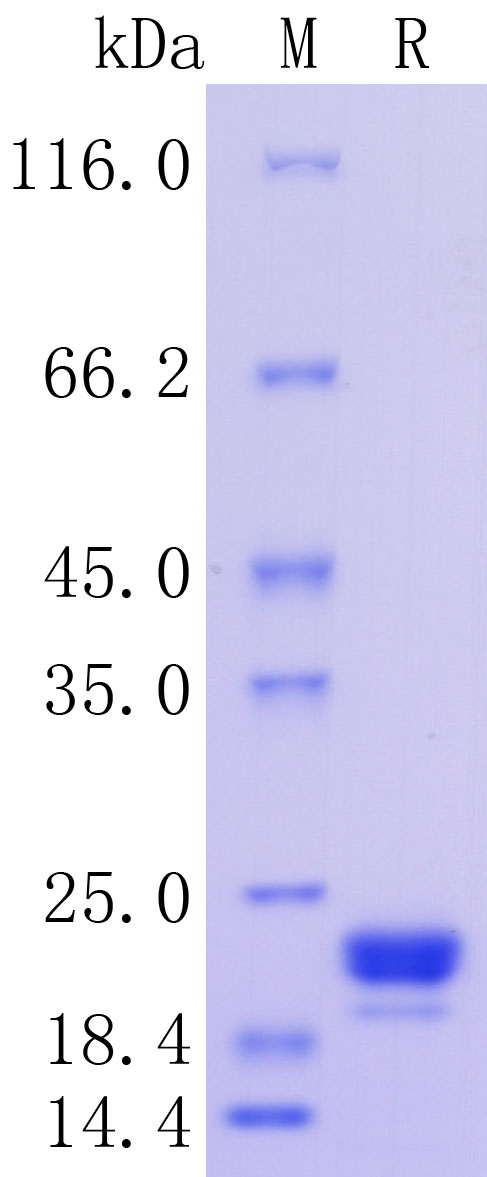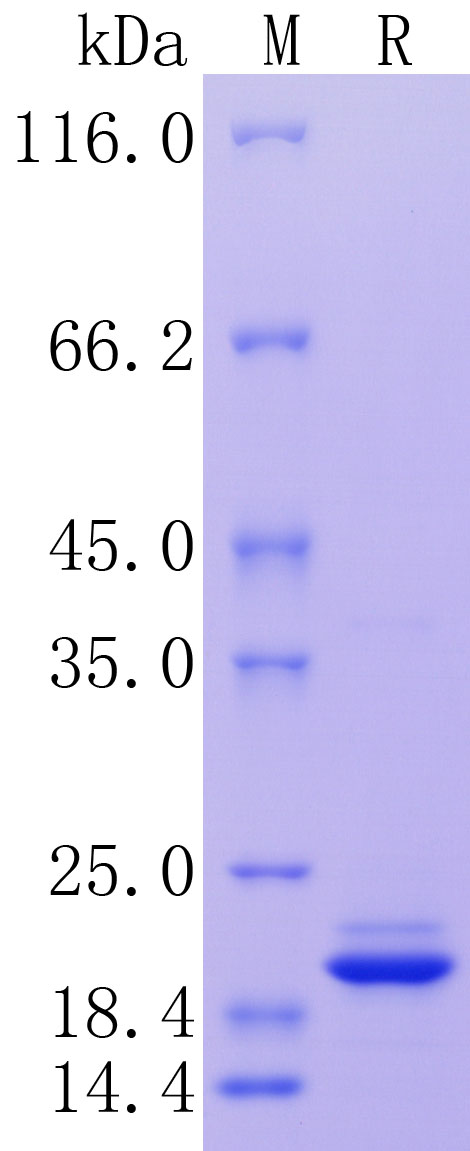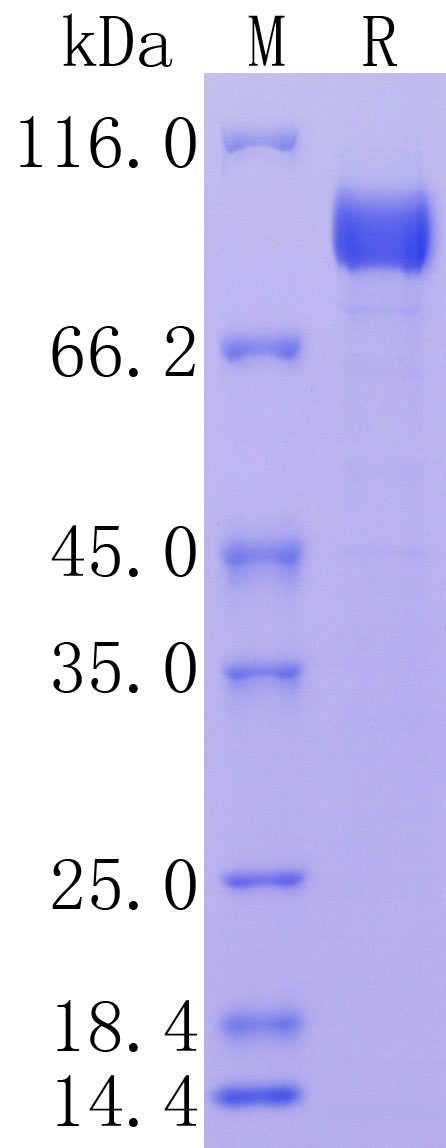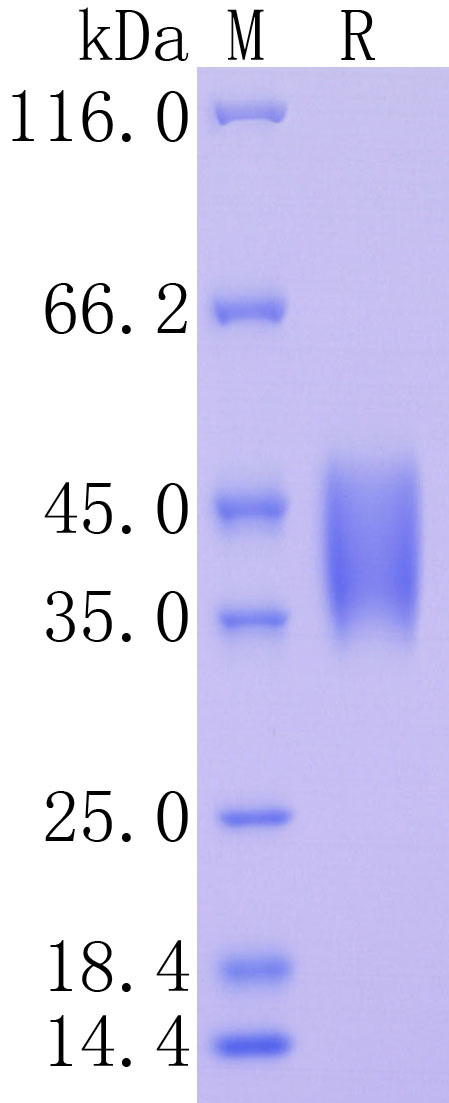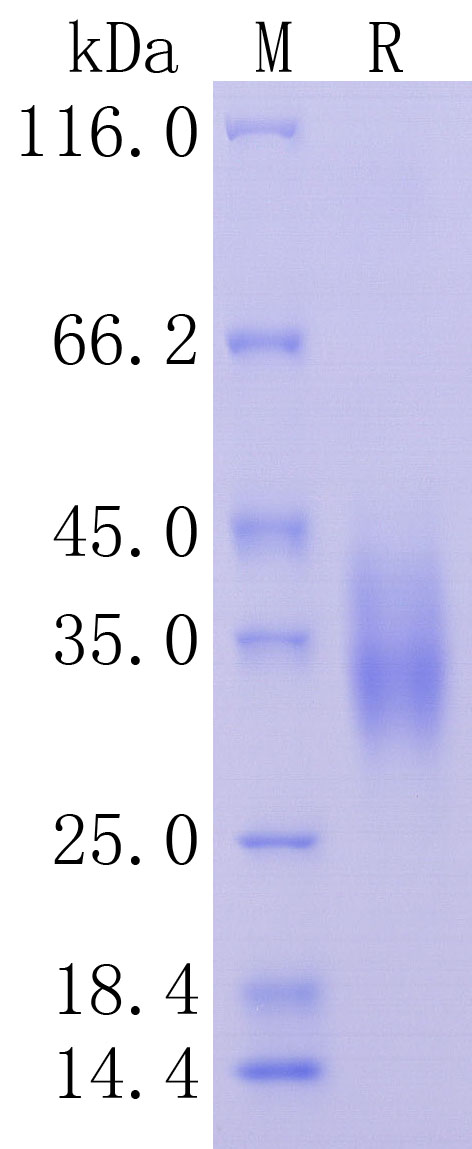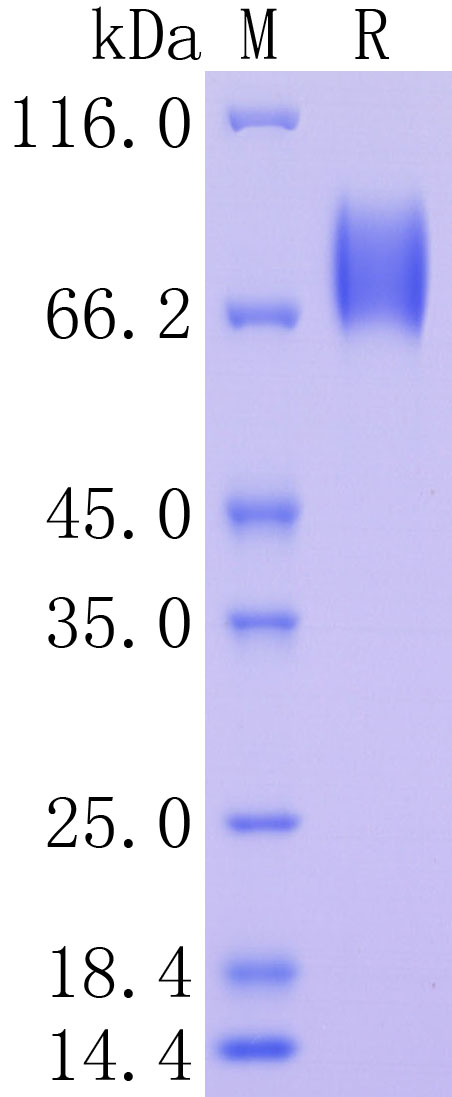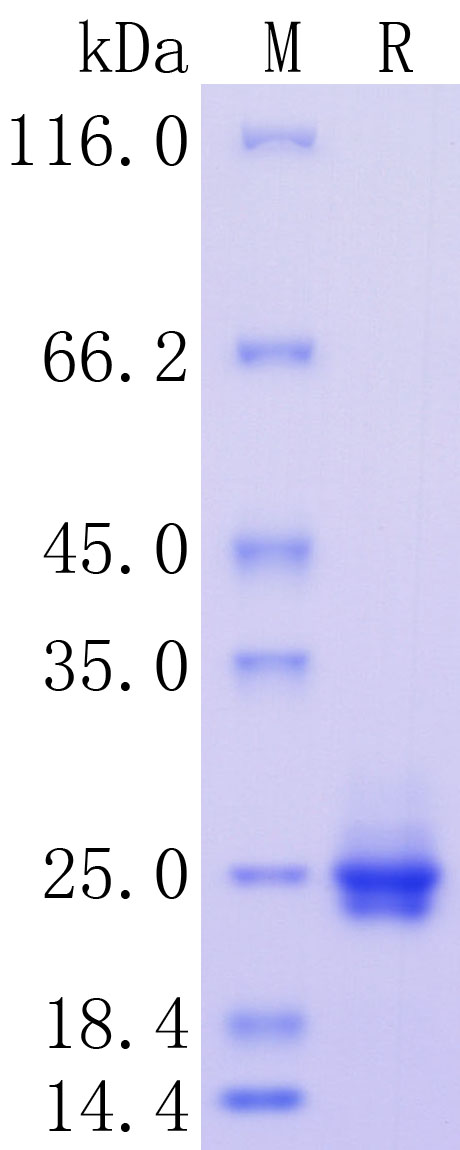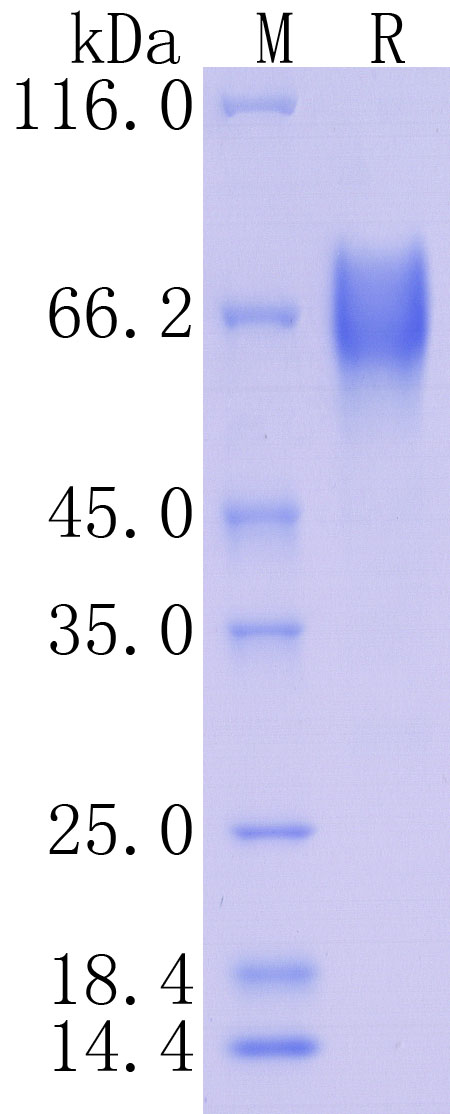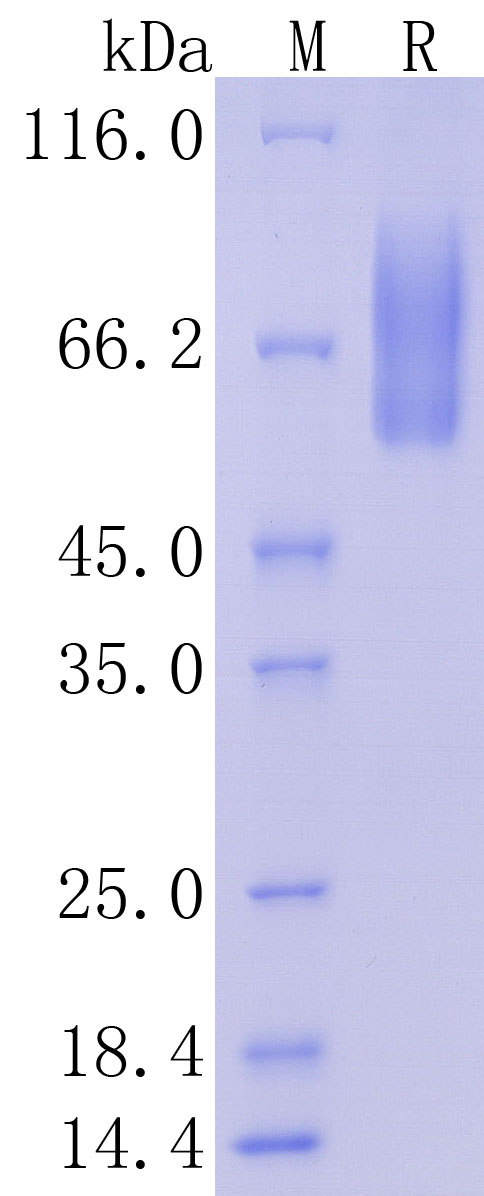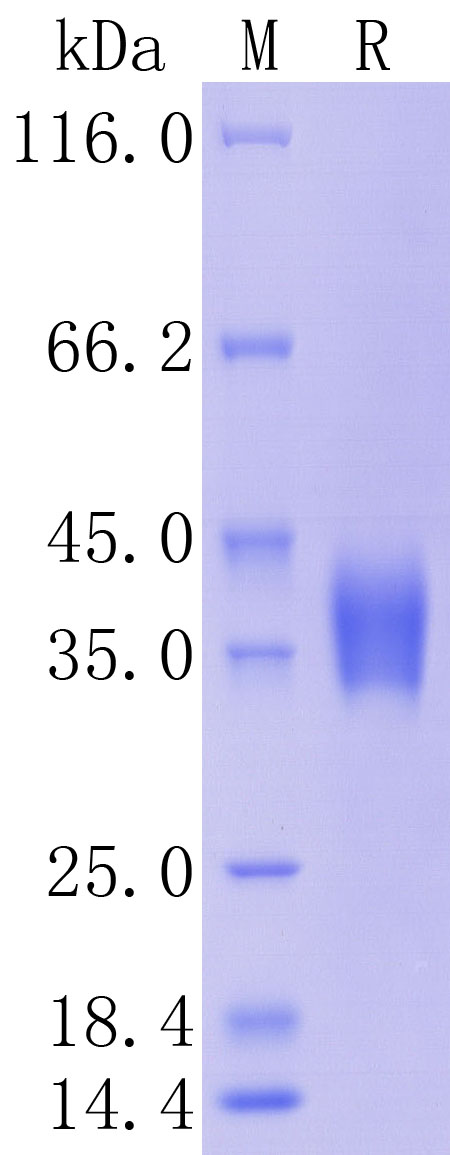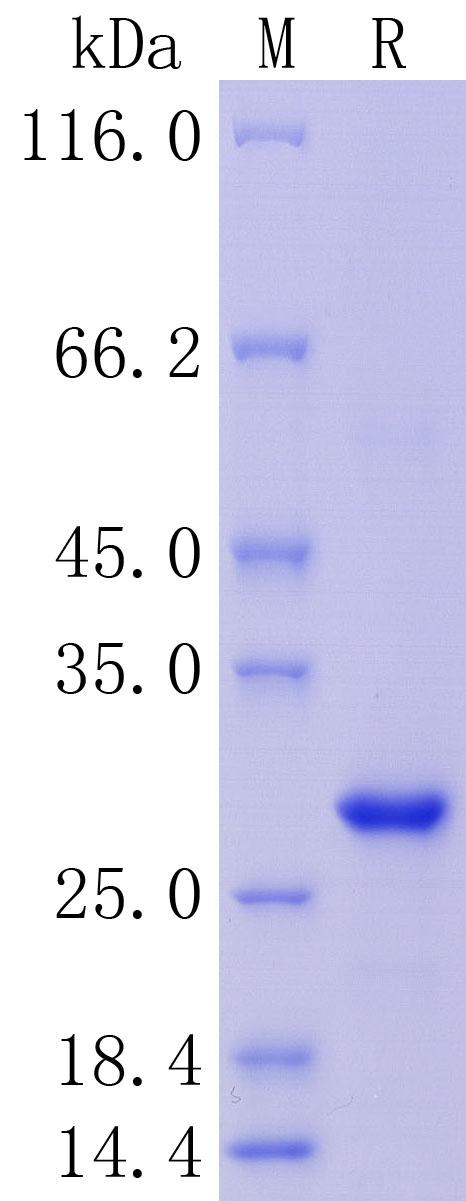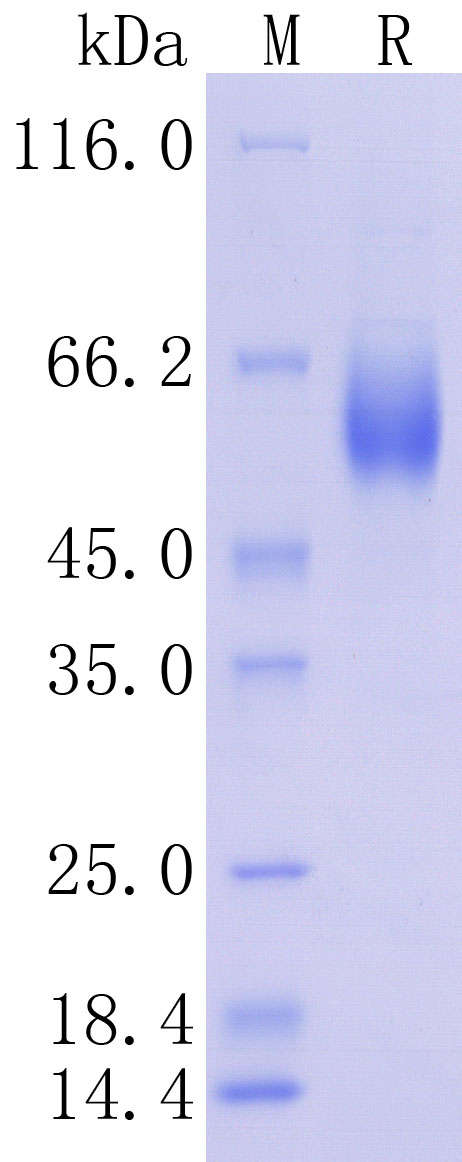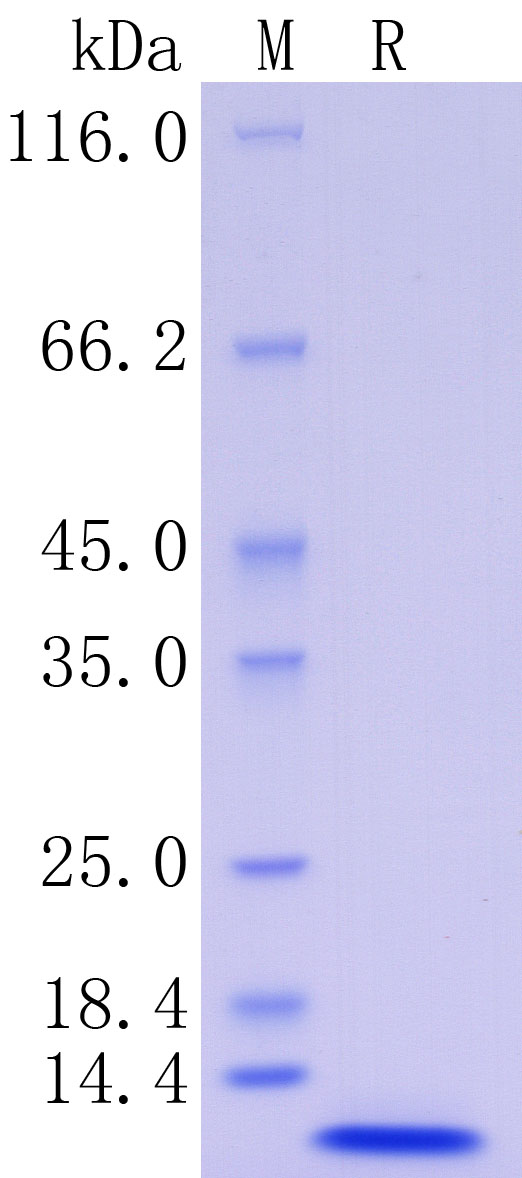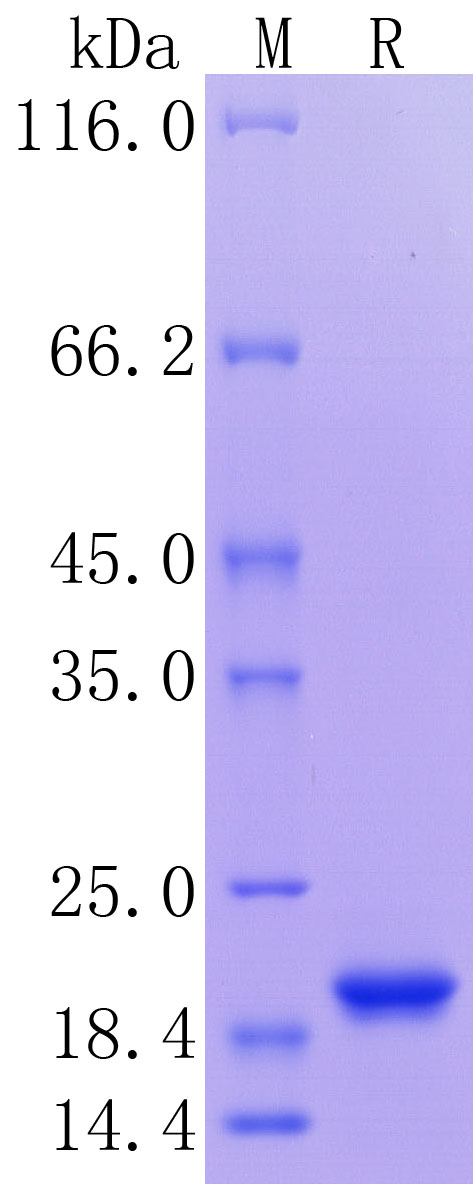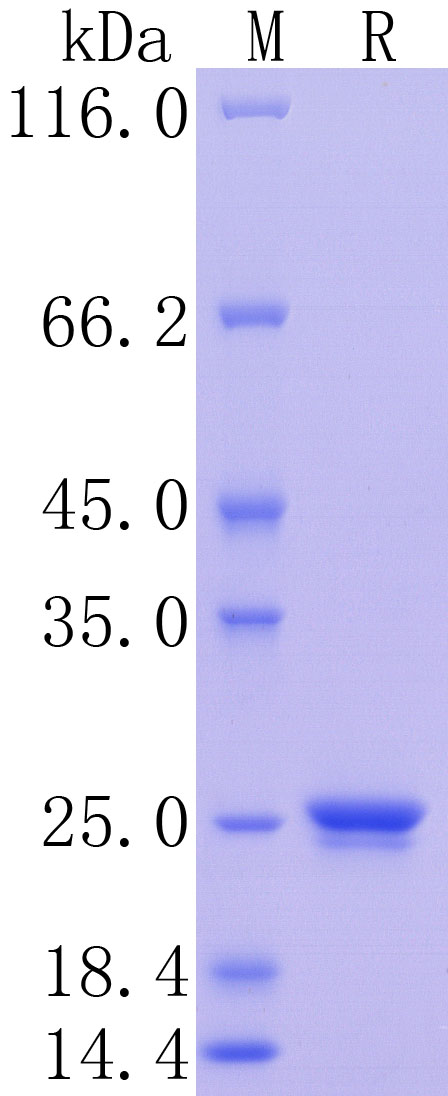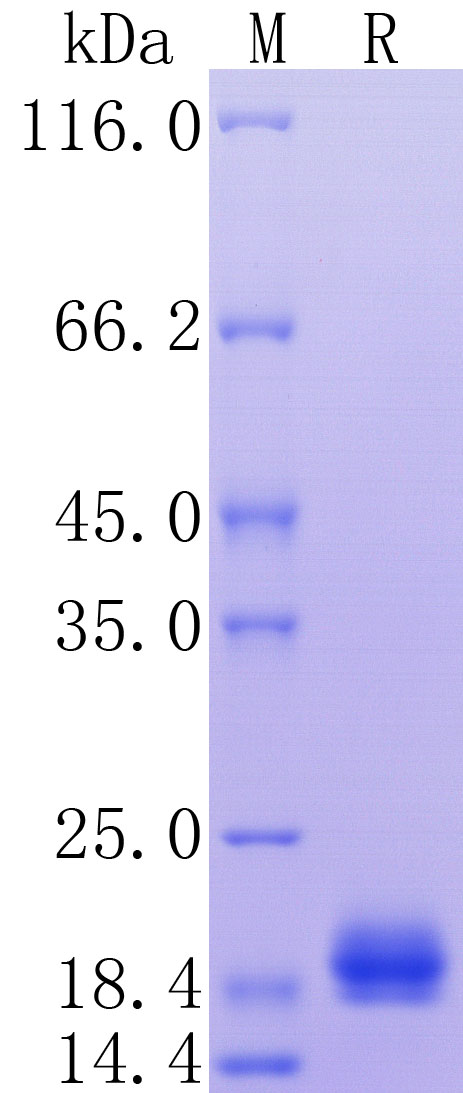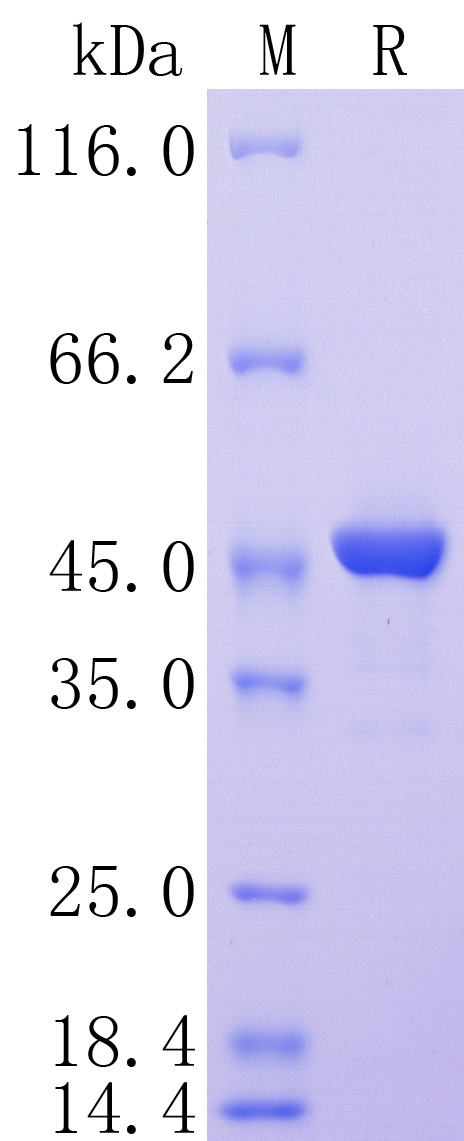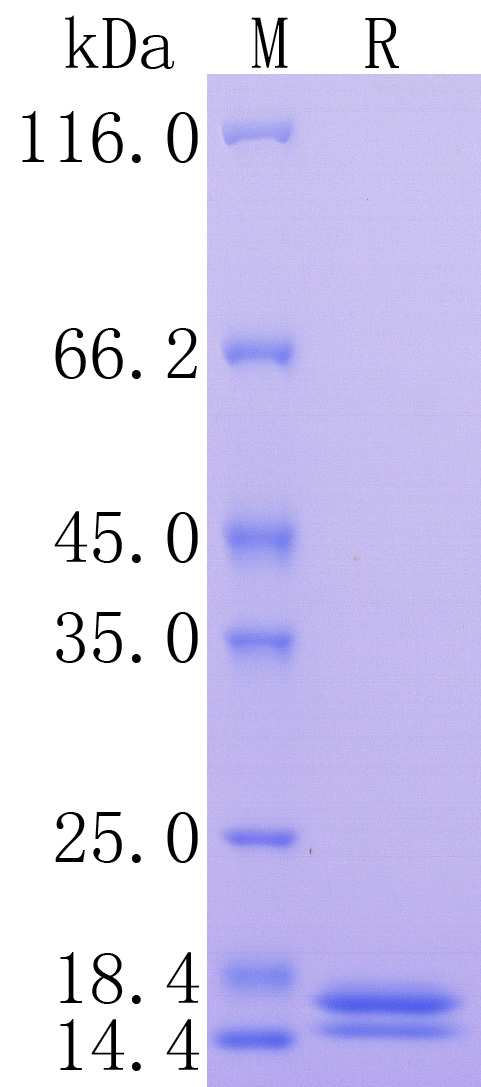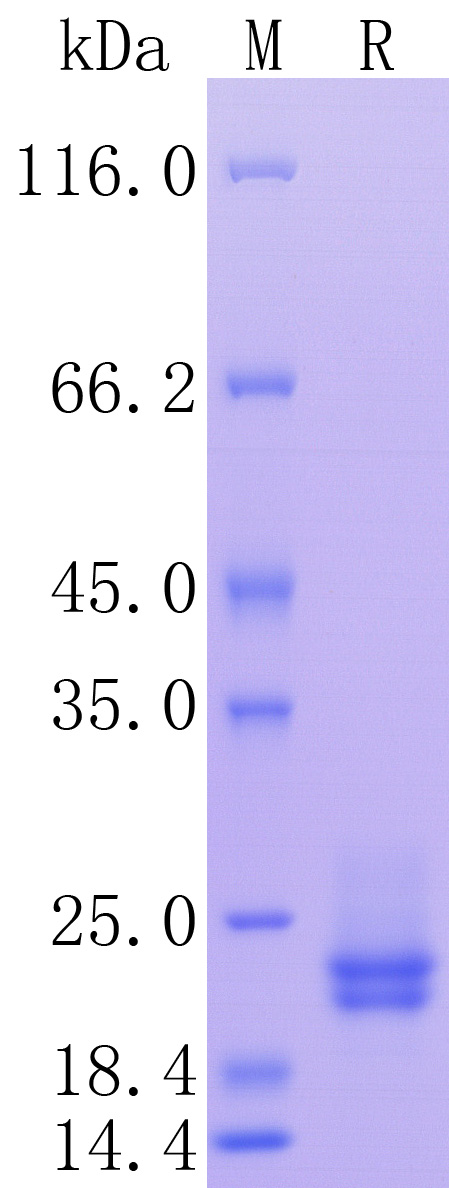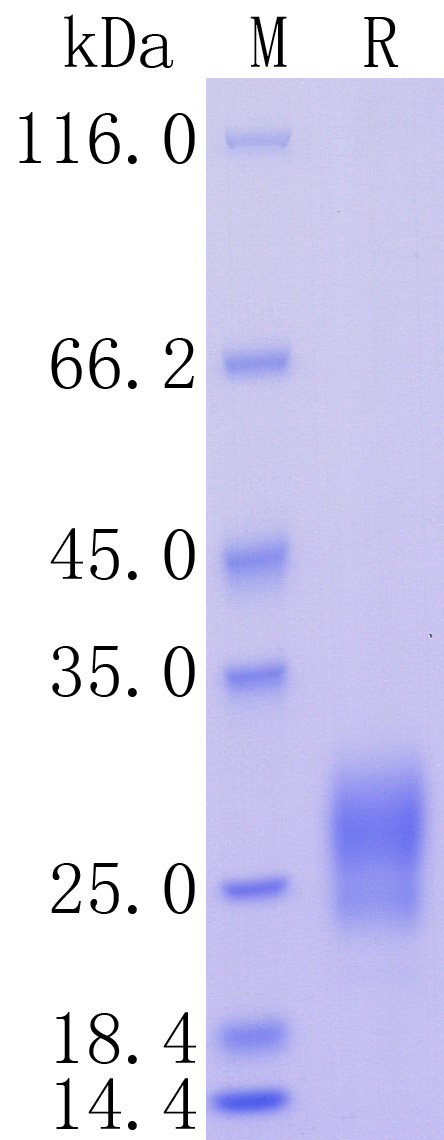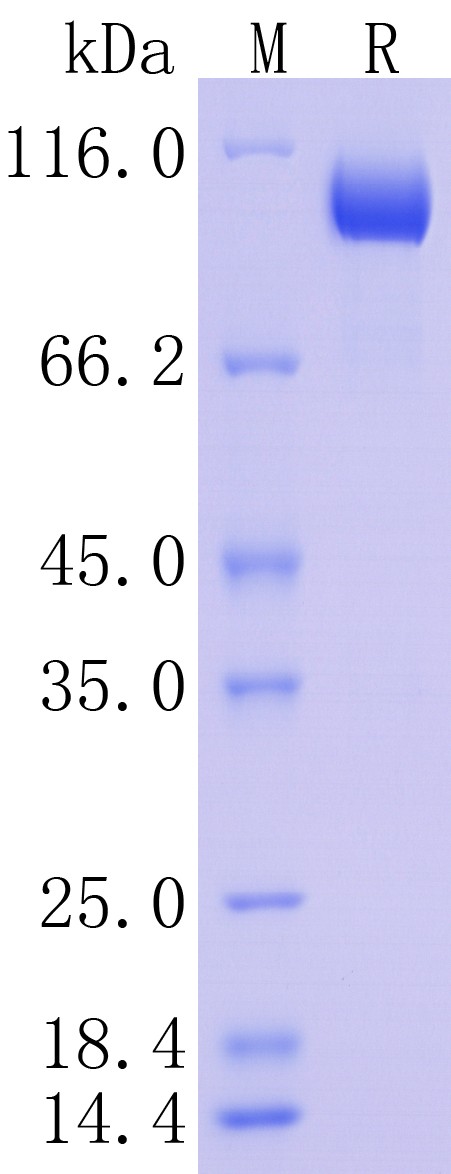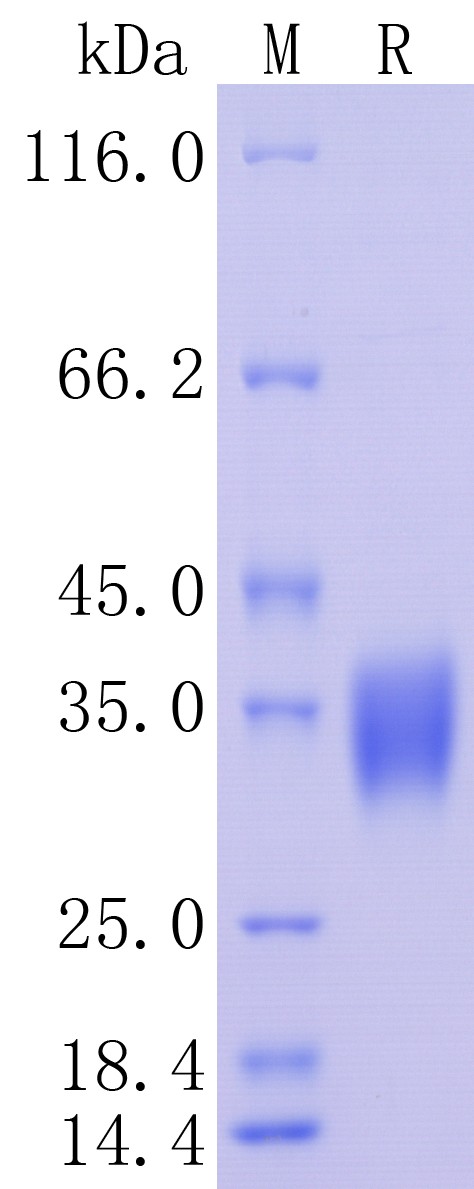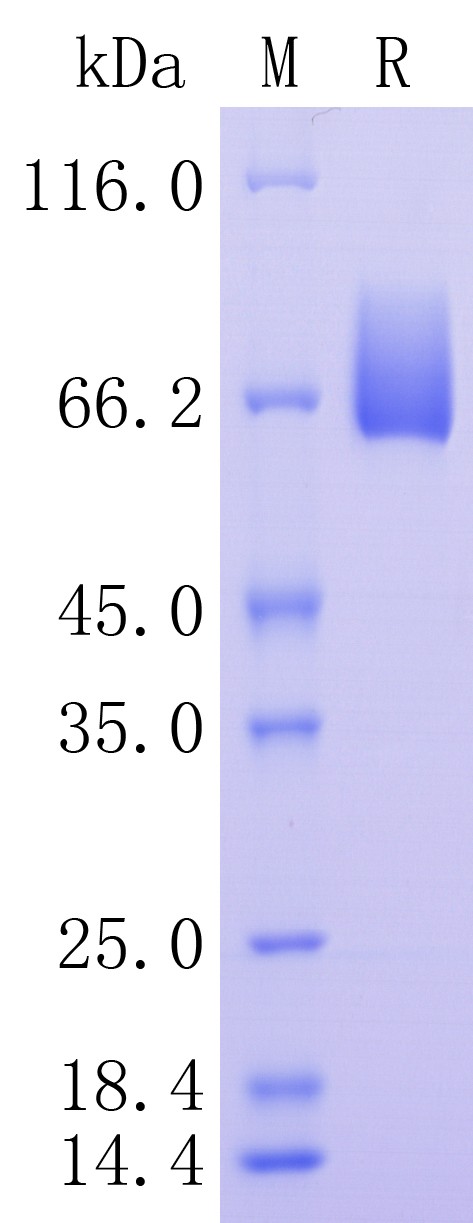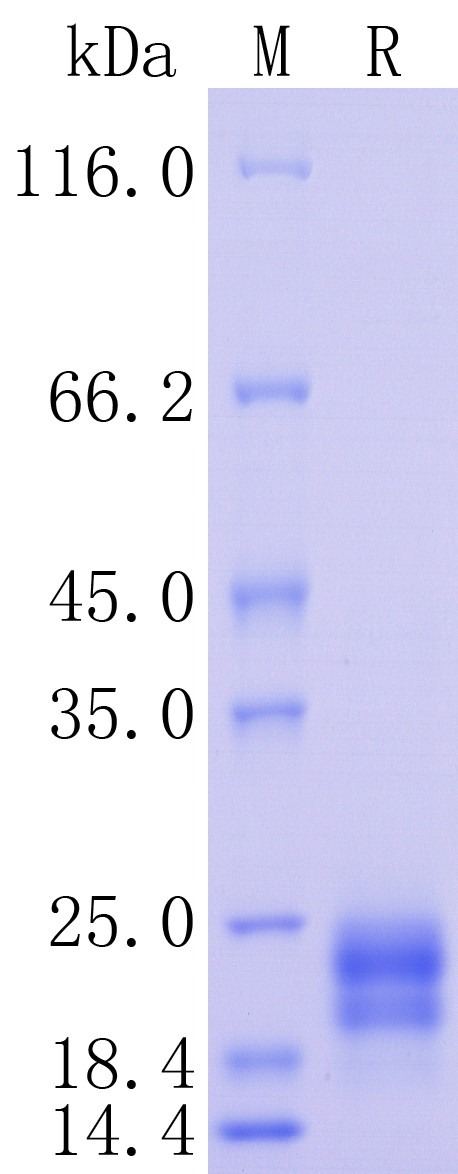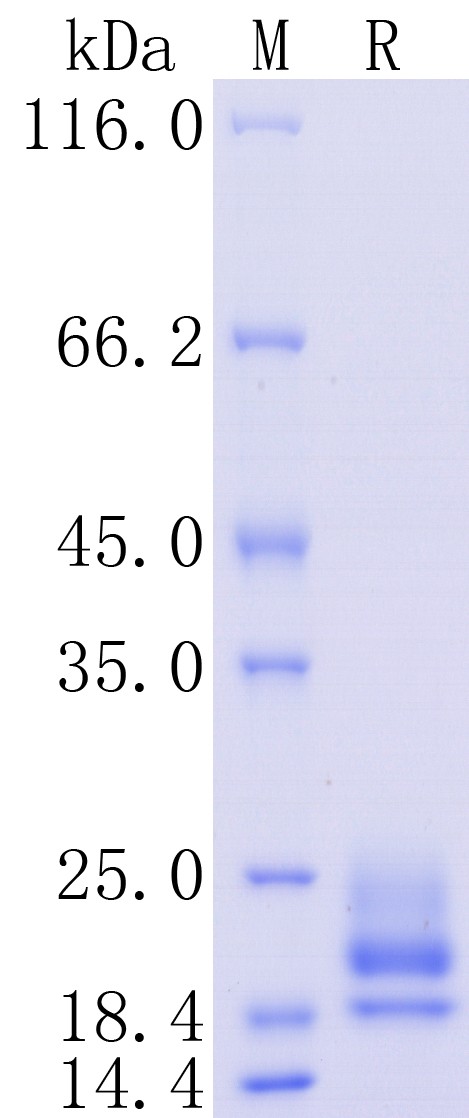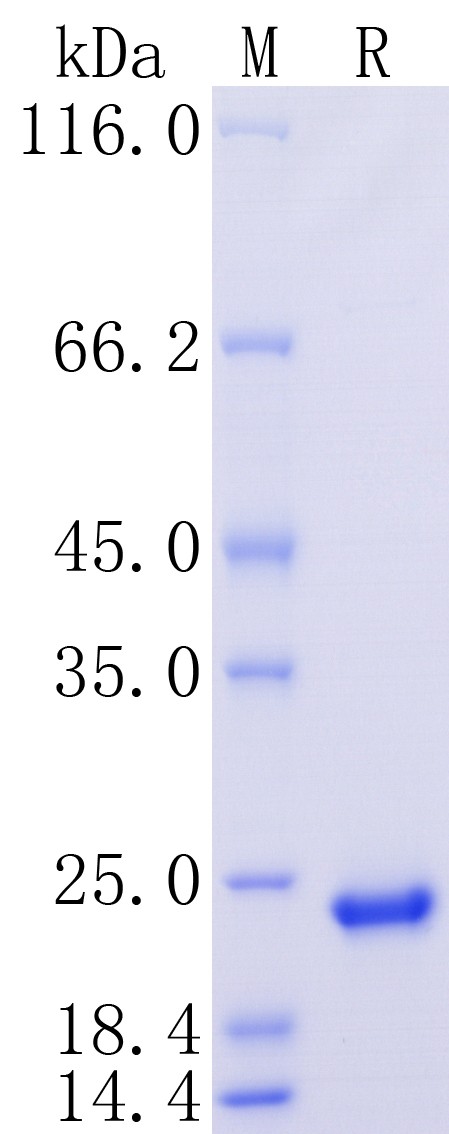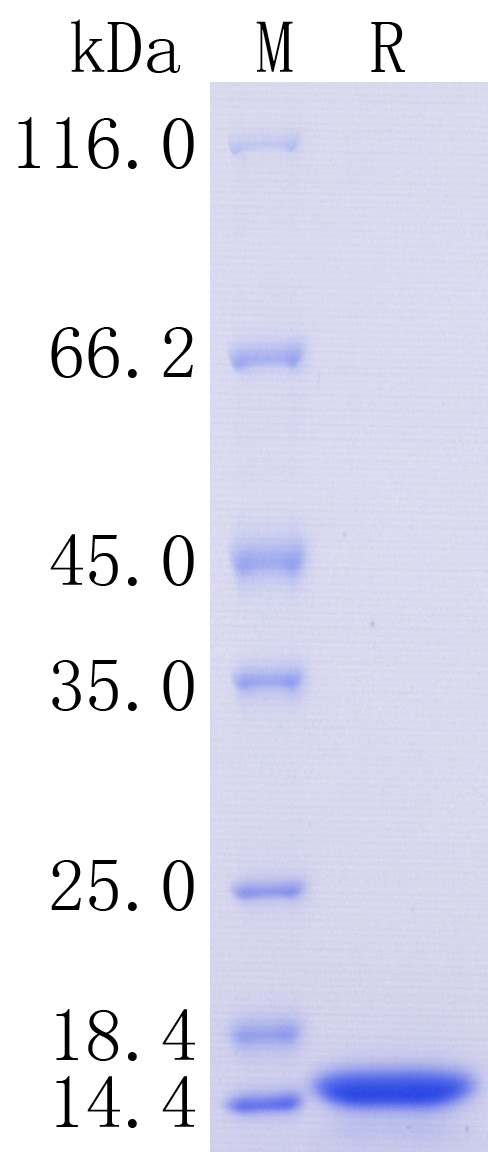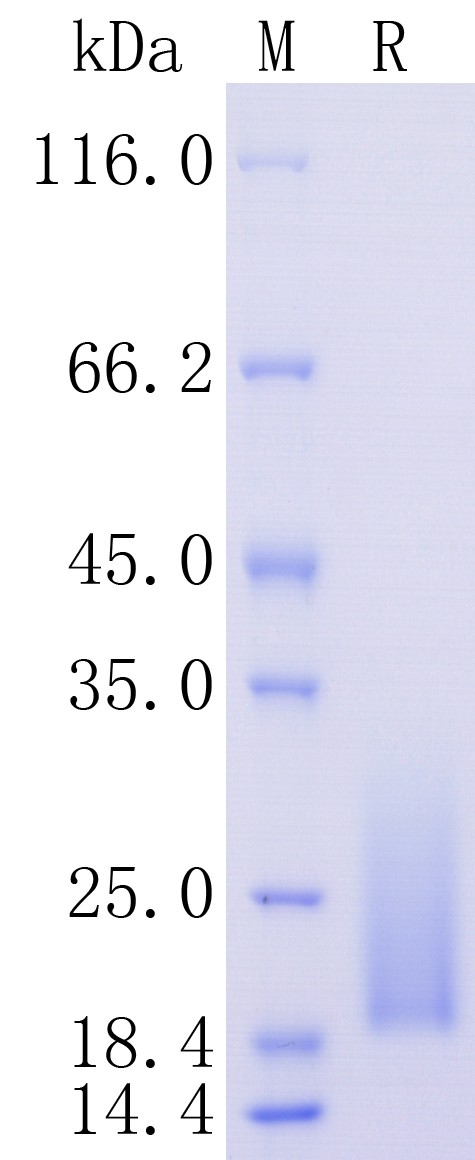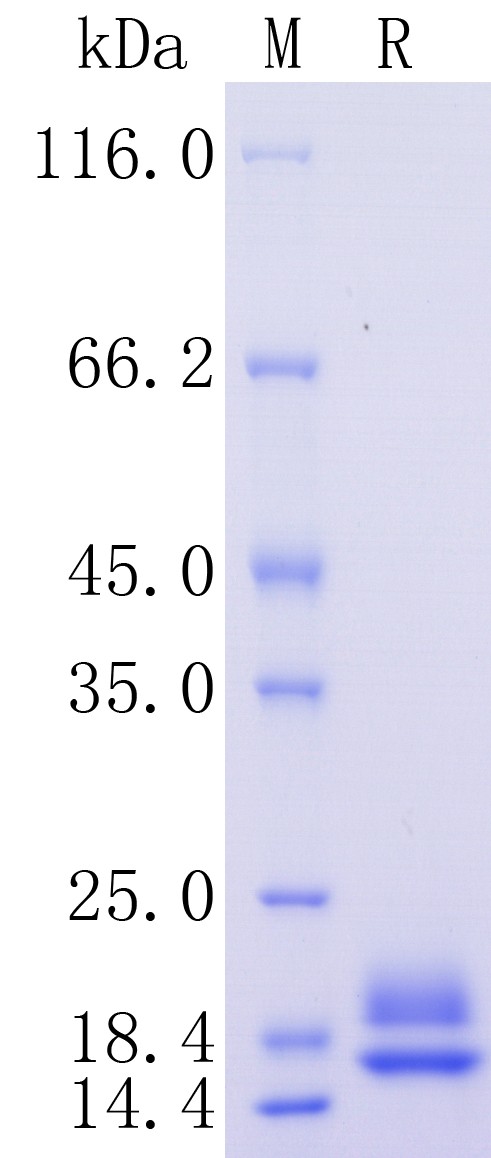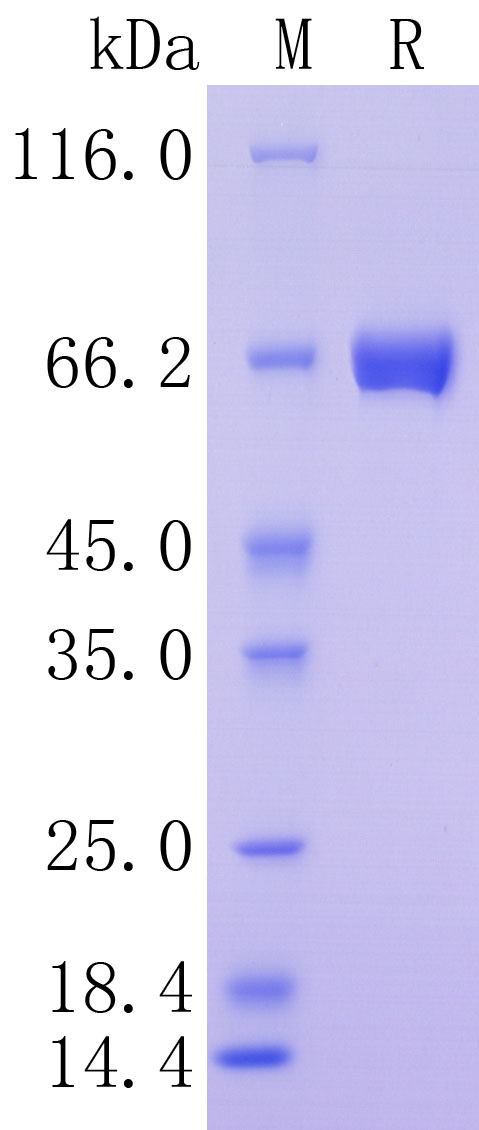Product Information
Product name
Human VEGF165, Tag Free
Catalog No.
HA210784
Predicted molecular mass
19.5 kD
Protein construction description
A DNA sequence encoding the human VEGF165 protein (P15692-4) (Ala 27-Arg 191) was expressed with tag free.
Accession
P15692-4
Protein construction
Source
HEK293
Bio Activity
Testing in progress.
Purity
>95% as determined by SDS-PAGE.
Endotoxin
Less than 1.0 EU per μg by the LAL method.
Formulation
Lyophilized from a 0.2 μm filtered solution of PBS, pH7.4, 5% Trehalose, 5% mannitol.
Species
Human
Background
This gene is a member of the PDGF/VEGF growth factor family. It encodes a heparin-binding protein, which exists as a disulfide-linked homodimer. This growth factor induces proliferation and migration of vascular endothelial cells, and is essential for both physiological and pathological angiogenesis. Disruption of this gene in mice resulted in abnormal embryonic blood vessel formation. This gene is upregulated in many known tumors and its expression is correlated with tumor stage and progression. Elevated levels of this protein are found in patients with POEMS syndrome, also known as Crow-Fukase syndrome. Allelic variants of this gene have been associated with microvascular complications of diabetes 1 (MVCD1) and atherosclerosis. Alternatively spliced transcript variants encoding different isoforms have been described. There is also evidence for alternative translation initiation from upstream non-AUG (CUG) codons resulting in additional isoforms. A recent study showed that a C-terminally extended isoform is produced by use of an alternative in-frame translation termination codon via a stop codon readthrough mechanism, and that this isoform is antiangiogenic. Expression of some isoforms derived from the AUG start codon is regulated by a small upstream open reading frame, which is located within an internal ribosome entry site. The levels of VEGF are increased during infection with severe acute respiratory syndrome coronavirus 2 (SARS-CoV-2), thus promoting inflammation by facilitating recruitment of inflammatory cells, and by increasing the level of angiopoietin II (Ang II), one of two products of the SARS-CoV-2 binding target, angiotensin-converting enzyme 2 (ACE2). In turn, Ang II facilitates the elevation of VEGF, thus forming a vicious cycle in the release of inflammatory cytokines.
Usage guide
Shipping
In general, recombinant proteins are provided as lyophilized powder which are shipped with blue ice. Bulk packages of recombinant proteins are provided as frozen liquid which are shipped with dry ice.
Storage
Please avoid repeated freeze-thaw cycles. Samples are stable for up to twelve months from date of receipt at -20℃ to -80℃ It is recommended that aliquot the reconstituted solution to minimize freeze-thaw cycles.
Reconstitution
Reconstitute at 250 μg/ml in sterile water.
同靶点&同通路的产品
Human CXCL5, Tag Free
Application:
Reactivity: Human
Conjugate:
Human FGF7, Tag Free
Application:
Reactivity: Human
Conjugate:
Human HGF, Tag Free
Application:
Reactivity: Human
Conjugate:
Human ACE2, C-His Tag (ECD)
Application:
Reactivity: Human
Conjugate:
Human IL-2, C-His Tag
Application:
Reactivity: Human
Conjugate:
Human BAFF/BLyS/TNFSF13B, Tag Free (ECD)
Application:
Reactivity: Human
Conjugate:
Human MAPK12, C-His Tag
Application:
Reactivity: Human
Conjugate:
Human IFN-gamma R1, C-His Tag (ECD)
Application:
Reactivity: Human
Conjugate:
Human IL2RG/CD132, C-His Tag (ECD)
Application:
Reactivity: Human
Conjugate:
Human TRAF3, C-His Tag
Application:
Reactivity: Human
Conjugate:
Human IL-1 alpha/IL1A, C-His, Flag Tag
Application:
Reactivity: Human
Conjugate:
Human cIAP-2/BIRC3, N-Twin Strep, C-His, Flag Tag
Application:
Reactivity: Human
Conjugate:
Human IL-8/CXCL8 Tag Free
Application:
Reactivity: Human
Conjugate:
Human Interferon alpha-2/IFNA2, C-His Tag
Application:
Reactivity: Human
Conjugate:
Human MMP-2/CLG4A, C-His, Flag Tag
Application:
Reactivity: Human
Conjugate:
Human TOPBP1, C-His Tag
Application:
Reactivity: Human
Conjugate:
Human Prolactin/PRL, C-His, Flag Tag
Application:
Reactivity: Human
Conjugate:
Human Periostin/OSF-2, C-His, Flag Tag
Application:
Reactivity: Human
Conjugate:
Human MMP-9, C-His, Flag Tag
Application:
Reactivity: Human
Conjugate:
Human IL-4R, C-His, Tag (ECD)
Application:
Reactivity: Human
Conjugate:
Human CXCL10, C-Flag Tag
Application:
Reactivity: Human
Conjugate:
Human TNF-alpha, Tag Free
Application:
Reactivity: Human
Conjugate:
Human TNF-alpha, C-His Tag
Application:
Reactivity: Human
Conjugate:
Human FGF7, C-Flag Tag
Application:
Reactivity: Human
Conjugate:
Human IL-15, C-Flag Tag
Application:
Reactivity: Human
Conjugate:
Human IL-18, Tag Free
Application:
Reactivity: Human
Conjugate:
Human CCL2/MCP1, Tag Free
Application:
Reactivity: Human
Conjugate:
Human FGF Basic/FGF2, Tag Free
Application:
Reactivity: Human
Conjugate:
Human MMP-3, C-His, Flag Tag
Application:
Reactivity: Human
Conjugate:
Human GHRL, C-His, Flag Tag
Application:
Reactivity: Human
Conjugate:
Human CTLA-4, C-His Tag
Application:
Reactivity: Human
Conjugate:
Human CD31/PECAM-1, C-His Tag
Application:
Reactivity: Human
Conjugate:
Human TRAIL/TNFSF10, C-His Tag
Application:
Reactivity: Human
Conjugate:
Human IP-10/CXCL10, Tag Free
Application:
Reactivity: Human
Conjugate:
Human CXCL12/SDF-1, Tag Free
Application:
Reactivity: Human
Conjugate:
Human CCL3/MIP-1, Tag Free
Application:
Reactivity: Human
Conjugate:
Human MMP-1, C-Flag
Application:
Reactivity: Human
Conjugate:
Human CXCL2/GRO beta, Tag Free
Application:
Reactivity: Human
Conjugate:
Human Mesothelin/MSLN, Tag Free
Application:
Reactivity: Human
Conjugate:
Human VE-cadherin, Tag Free (ECD)
Application:
Reactivity: Human
Conjugate:
Human IGF1, Tag Free
Application:
Reactivity: Human
Conjugate:
Human CD28, C-His Tag
Application:
Reactivity: Human
Conjugate:
Human LILRB4/ILT3, C-His, Flag Tag (ECD)
Application:
Reactivity: Human
Conjugate:
Human Carbonic Anhydrase XII/CA12, Tag Free (ECD)
Application:
Reactivity: Human
Conjugate:
Human IL-17F, Tag Free
Application:
Reactivity: Human
Conjugate:
Human HGF, C-Flag Tag
Application:
Reactivity: Human
Conjugate:
Human CD63, Tag Free (ECD)
Application:
Reactivity: Human
Conjugate:
Human CDC42, Tag Free
Application:
Reactivity: Human
Conjugate:
Human G-CSF, C-His Tag
Application:
Reactivity: Human
Conjugate:
Human IL-2R alpha, Tag Free
Application:
Reactivity: Human
Conjugate:
Human CALCA, C-His Tag
Application:
Reactivity: Human
Conjugate:
Human IL-2RB/CD122, C-His Tag (ECD)
Application:
Reactivity: Human
Conjugate:
Human IL-7, C-His, Flag Tag
Application:
Reactivity: Human
Conjugate:
Human GM-CSF, Tag Free
Application:
Reactivity: Human
Conjugate:
Human IFN-gamma, C-His Tag
Application:
Reactivity: Human
Conjugate:
Human FGF10, C-Flag
Application:
Reactivity: Human
Conjugate:
Human EIF4B, C-His Tag
Application:
Reactivity: Human
Conjugate:
Human CXCL1, Tag Free
Application:
Reactivity: Human
Conjugate:
Human Sorcin/SRI, N-Twin Strep, C-His, Flag Tag
Application:
Reactivity: Human
Conjugate:
Human ACP1, C-His Tag
Application:
Reactivity: Human
Conjugate:
Human Mesothelin, C-His Tag
Application:
Reactivity: Human
Conjugate:
Human IMMT/Mitofilin, C-His Tag
Application:
Reactivity: Human
Conjugate:
Human IL-33, C-His Tag
Application:
Reactivity: Human
Conjugate:
Human CASQ2, Tag Free
Application:
Reactivity: Human
Conjugate:
Human IL-1 beta/IL1B, C-His Tag
Application:
Reactivity: Human
Conjugate:
Human FGF2/b-FGF, C-His, Flag Tag
Application:
Reactivity: Human
Conjugate:
Human IL1RL1/DER4/ST2, C-hFc, His (ECD)
Application:
Reactivity: Human
Conjugate:
Human IFN-alpha/beta R2, C-His Tag (ECD)
Application:
Reactivity: Human
Conjugate:
Human SCF/KITLG, C-His Tag (ECD)
Application:
Reactivity: Human
Conjugate:
Human Osteoactivin/GPNMB, C-His Tag (ECD)
Application:
Reactivity: Human
Conjugate:
Human IFN-alpha/beta R1, C-His (ECD)
Application:
Reactivity: Human
Conjugate:
Human IL-6, C-His Tag
Application:
Reactivity: Human
Conjugate:
Human IL-6R, C-His (ECD)
Application:
Reactivity: Human
Conjugate:
Human MMP-8/CLG1, C-His, Flag Tag
Application:
Reactivity: Human
Conjugate:
Human CD30/TNFRSF8, C-His, Flag Tag (ECD)
Application:
Reactivity: Human
Conjugate:
Human EPCR/PROCR/CD201, C-His, Flag Tag (ECD)
Application:
Reactivity: Human
Conjugate:
Human CDCP1/CD318, N-Twin Strep, C-His, Flag Tag
Application:
Reactivity: Human
Conjugate:
Human IL1RL1/DER4/ST2, C-His (ECD)
Application:
Reactivity: Human
Conjugate:
Human EGF, Tag Free
Application:
Reactivity: Human
Conjugate:
Human IL-17A, Tag Free
Application:
Reactivity: Human
Conjugate:
Human IFNA1/IFNA13, C-Tag
Application:
Reactivity: Human
Conjugate:
Human CCL3L1, N-Twin Strep, C-His, Flag Tag
Application:
Reactivity: Human
Conjugate:
Human RAC1, C-Flag Tag
Application:
Reactivity: Human
Conjugate:
Human IL-4, Tag Free
Application:
Reactivity: Human
Conjugate:
Human CKM, C-His, Flag Tag
Application:
Reactivity: Human
Conjugate:
Human IL-2, Tag Free
Application:
Reactivity: Human
Conjugate:
Human IL-6, Tag Free
Application:
Reactivity: Human
Conjugate:
Human IL-7, Tag Free
Application:
Reactivity: Human
Conjugate:
Human TIE2/TEK, C-His, Flag Tag (ECD)
Application:
Reactivity: Human
Conjugate:
Human Erythropoietin/EPO, C-His, Flag Tag
Application:
Reactivity: Human
Conjugate:
Human MMP13, C-His, Flag Tag
Application:
Reactivity: Human
Conjugate:
Human MMP-12, C-Flag Tag
Application:
Reactivity: Human
Conjugate:
Human ICAM-1/CD54, C-His Tag (ECD)
Application:
Reactivity: Human
Conjugate:
Human PDGF-B, Tag Free
Application:
Reactivity: Human
Conjugate:
Human VEGF-C, C-His, Flag Tag
Application:
Reactivity: Human
Conjugate:
Human Angiopoietin-1/ANGPT1, Tag Free
Application:
Reactivity: Human
Conjugate:
Human E-Cadherin, C-His Tag (ECD)
Application:
Reactivity: Human
Conjugate:
Human M-CSF/CSF1 (33-255), C His Tag
Application:
Reactivity: Human
Conjugate:
Human M-CSF/CSF1 (33-190), Tag Free
Application:
Reactivity: Human
Conjugate:
Human FGF-21, C-His Tag
Application:
Reactivity: Human
Conjugate:
Human SAA1, C-Flag Tag
Application:
Reactivity: Human
Conjugate:
Human IL-3, Tag Free
Application:
Reactivity: Human
Conjugate:
Human VEGF121, Tag Free
Application:
Reactivity: Human
Conjugate:
Human ACP3/ACPP, C His, Flag Tag
Application:
Reactivity: Human
Conjugate:
Human A2M/alpha-2-macroglobulin, C-His Tag
Application:
Reactivity: Human
Conjugate:
